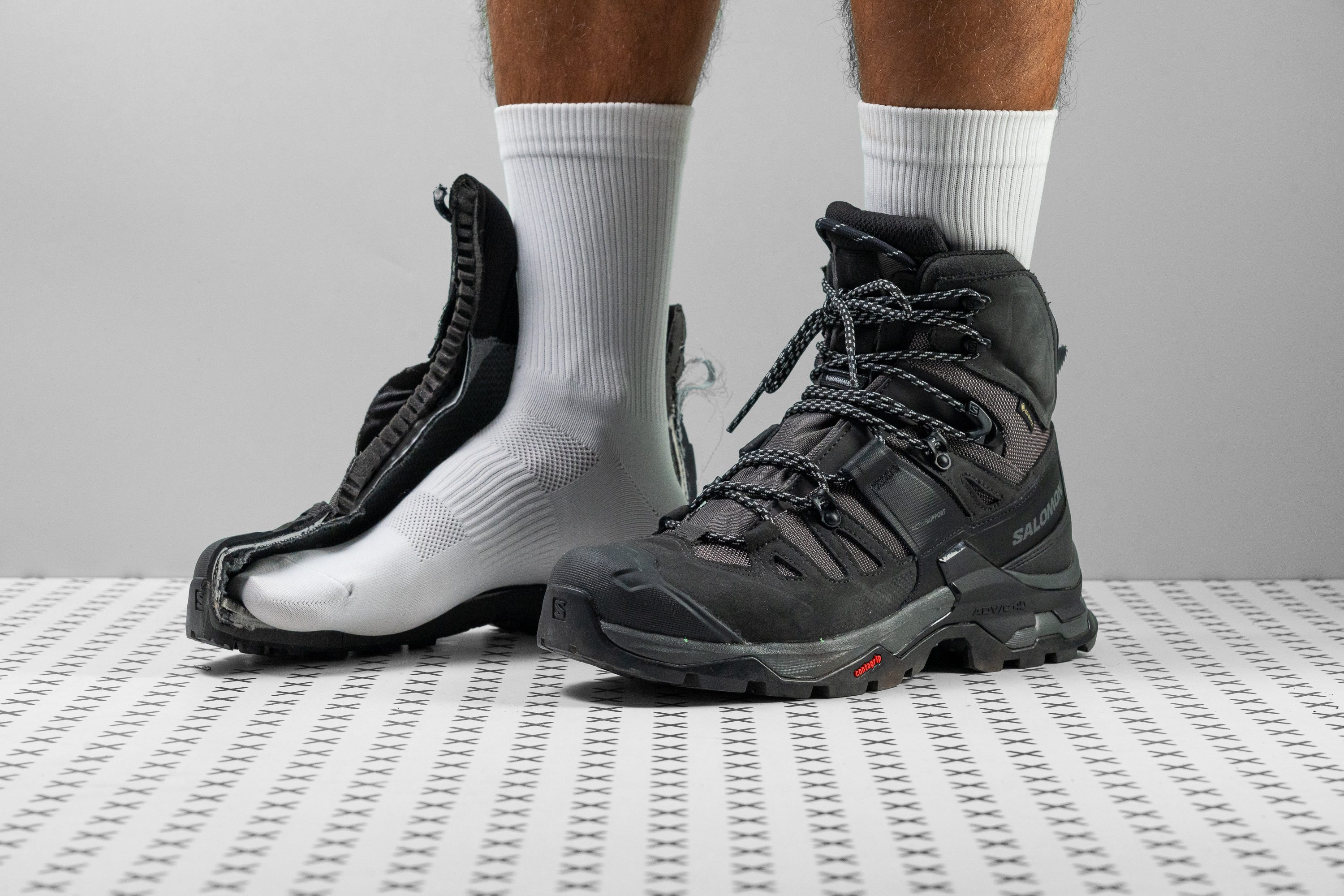Our verdict
- Top pick in best hiking boots
- Top pick in best backpacking boots
Pros
- Exceptional durability
- Top-notch waterproofing
- Excellent underfoot protection
- Highly secure ankle support
- Fantastic stability
- Comfortable in-boot feel
- Effective grip on various terrain
- Fits as expected
Cons
- A bit heavy
- Gets very stiff in cold
Audience verdict
- Top 22% most popular hiking boots
Comparison
The most similar hiking boots compared
+ + Add a shoe | |||||
|---|---|---|---|---|---|
| Audience score | 85 Great! | 89 Great! | 85 Great! | 90 Great! | |
| Price | $230 | $235 | $160 | $255 | |
| Trail terrain | Technical | ModerateTechnical | Moderate | Technical | |
| Shock absorption | Low | Low | Low | Moderate | |
| Energy return | Moderate | High | Moderate | High | |
| Weight lab Weight brand | 23.4 oz / 663g 23.1 oz / 655g | 21.2 oz / 601g 19.4 oz / 550g | 19.9 oz / 563g | 21.1 oz / 597g 19.5 oz / 553g | |
| Breathability | Warm | Warm | Warm | Warm | |
| Use | BackpackingDay HikingSnow | BackpackingDay HikingSnow | BackpackingDay HikingSnowBeginners | BackpackingDay HikingSnow | |
| Orthotic friendly | ✓ | ✓ | ✓ | ✓ | |
| Drop lab | 18.0 mm | 12.6 mm | 16.4 mm | 17.2 mm | |
| Size | True to size | Slightly small | Slightly small | True to size | |
| Midsole softness | Balanced | Balanced | Firm | Balanced | |
| Difference in midsole softness in cold | Normal | Normal | Small | Small | |
| Heel counter stiffness | Stiff | Moderate | Stiff | Flexible | |
| Stiffness | Stiff | Stiff | Flexible | Moderate | |
| Outsole hardness | Average | Very soft | Average | Average | |
| Waterproofing | Waterproof | Waterproof | Waterproof | Waterproof | |
| Material | Textile | Leather | LeatherMesh | Leather | |
| Season | Winter | Winter | Winter | Winter | |
| Toebox durability | Good | Good | Bad | Good | |
| Heel padding durability | Good | Bad | Bad | Decent | |
| Outsole durability | Decent | Decent | Decent | Decent | |
| Width / fit | Wide | Medium | Medium | Medium | |
| Toebox width | Medium | Medium | Medium | Narrow | |
| Lug depth | 4.7 mm | 4.7 mm | 4.6 mm | 5.1 mm | |
| Heel stack lab | 38.0 mm | 36.3 mm | 38.7 mm | 37.8 mm | |
| Forefoot | 20.0 mm | 23.7 mm | 22.3 mm | 20.6 mm | |
| Widths available | Normal | Normal | Normal | NarrowNormalWide | |
| Technology | Gore-TexOrtholite | Gore-Tex | - | Gore-TexVibram | |
| Cut | High cut | Mid cut | Mid cut | Mid cut | |
| Removable insole | ✓ | ✓ | ✓ | ✓ | |
| Ranking | #24 Bottom 41% | #11 Top 27% | #23 Bottom 43% | #7 Top 18% | |
| Popularity | #9 Top 22% | #26 Bottom 36% | #37 Bottom 9% | #16 Top 40% |
Who should buy
Having tried and tested numerous hiking boots, we still believe that the Salomon Quest 4 GTX is the GOAT in its category. We highly recommend investing in this boot if:
- you need an exceptionally supportive backpacking footwear for multi-day trips
- a 100% waterproof boot with phenomenal grip on wet surfaces
- an extra hard-wearing boot for tough terrain
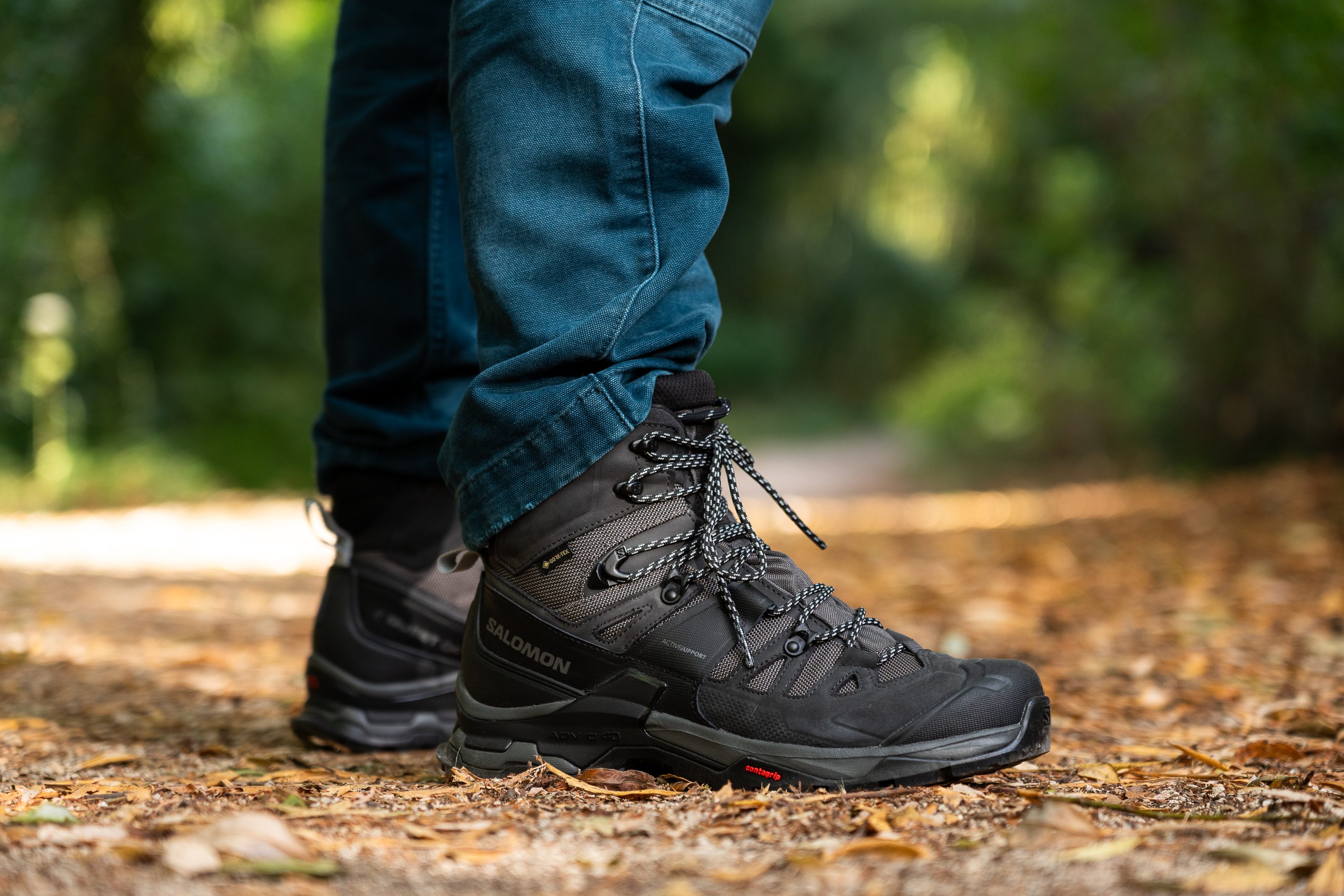
Who should NOT buy
Given how much technology is packed into the Quest 4 GTX, it could be too much of a good thing if you need a boot for moderate hikes. For smoother trails and less demanding adventures, we find the Salomon X Ultra 4 Mid GTX more suitable. It is lighter, more pliable, cheaper, and yet has all the essentials for an enjoyable day hike.
Another excellent backpacking option is the Hoka Kaha 2 GTX. A whopping 5 oz lighter, it is also softer, cushier, and more comfortable around the foot than the Quest 4 GTX.
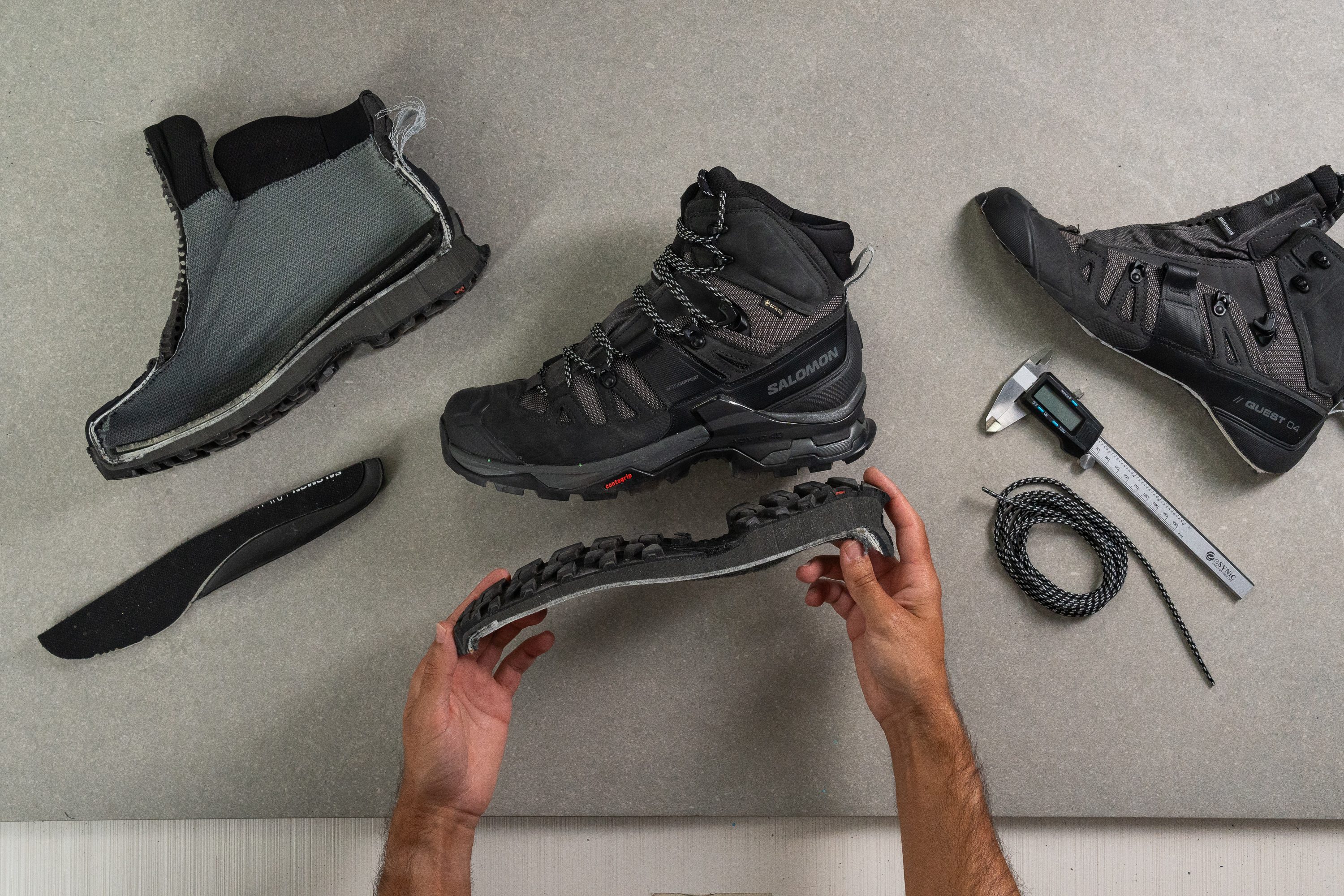
Cushioning
Shock absorption
Sturdy backpacking boots have to sacrifice underfoot compression and comfort to maintain the most stable and surefooted ride under heavy load. That's why at 79 SA, the Quest 4 GTX's shock absorption is limited (but not absent).
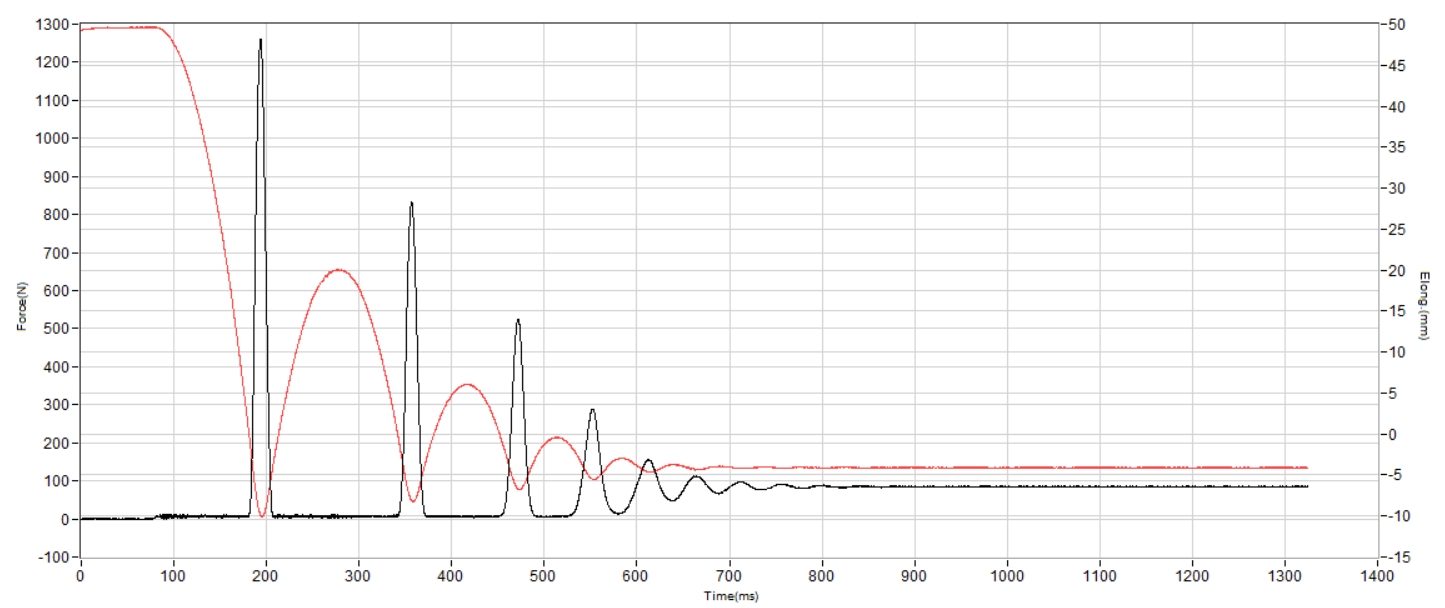
| Quest 4 GTX | 79 SA |
| Average | 93 SA |
Energy return
There is no springback in this Salomon boot's platform either. It showed a low energy return of 47.3% which feels flat and muted underfoot. But the upside is that you get an amazingly stable and supportive experience.
| Quest 4 GTX | 47.3% |
| Average | 50.5% |
Heel stack
The Quest 4 GTX is equipped with a sizable platform to help you cover long miles with a heavy pack on your back.
In the heel, we found that the stack height comes in at 38 mm which is slightly above the average of day hiking boots.
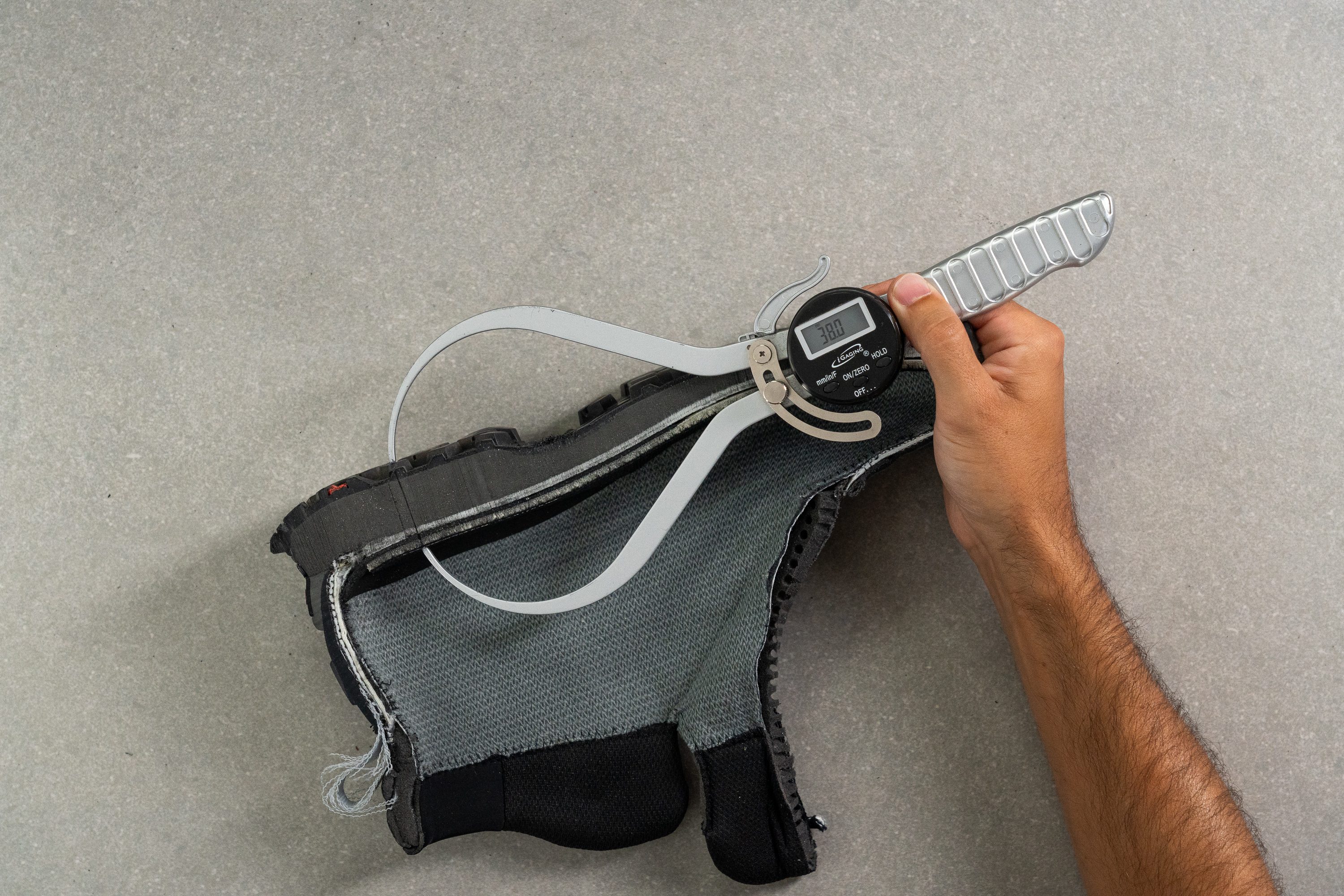
| Quest 4 GTX | 38.0 mm |
| Average | 36.3 mm |
Forefoot stack
In the forefoot, the boot's stack height lowers down to 20 mm. This, on the contrary, is a few millimeters thinner than the average.
We assume that it was made lower on purpose, to help the boot bend more easily in this area.
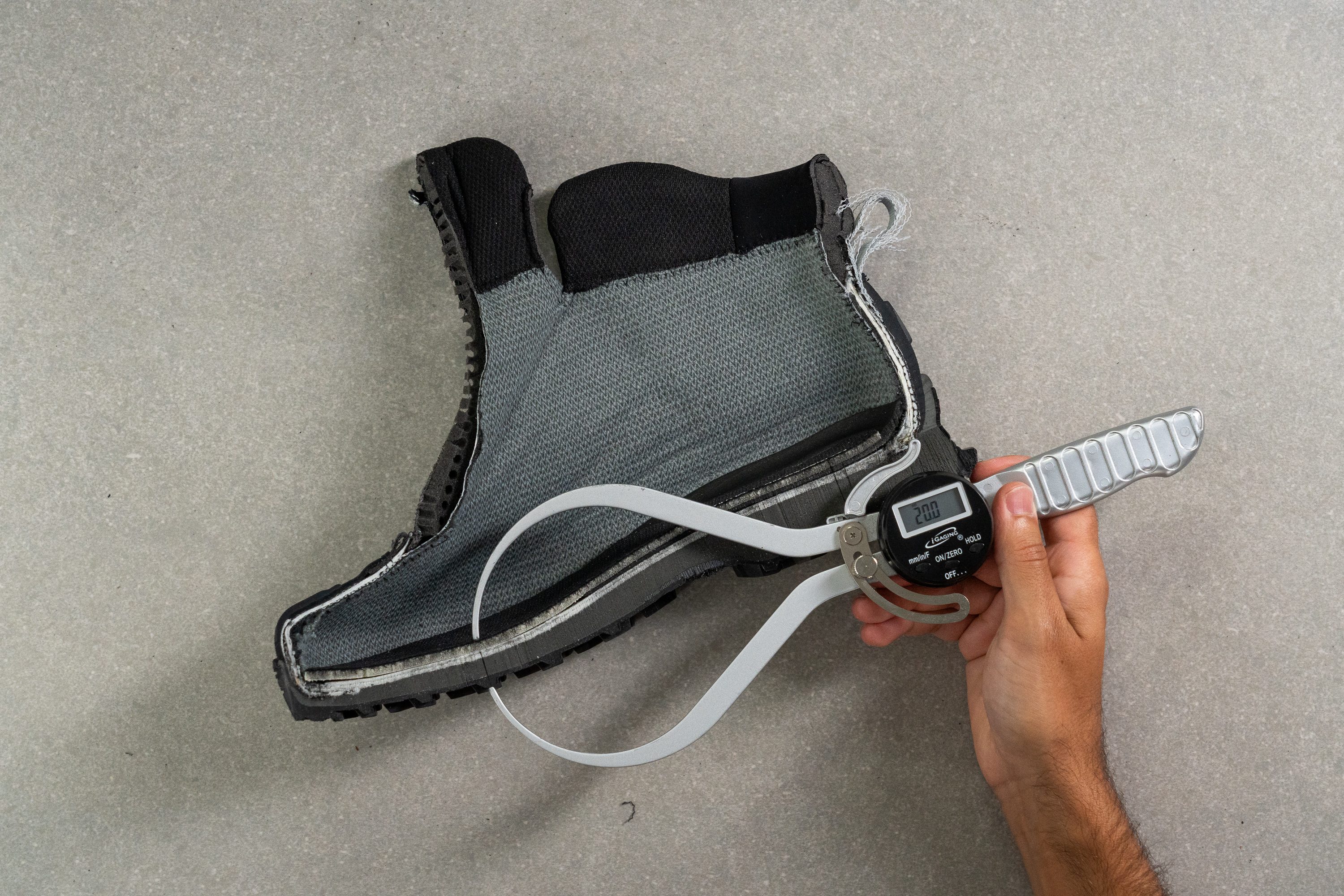
| Quest 4 GTX | 20.0 mm |
| Average | 23.0 mm |
Drop
Based on our stack height measurements, we see a huge 18-mm difference in height between the heel and the toes. That's about 5 mm higher than the average and may feel too much for some hikers.
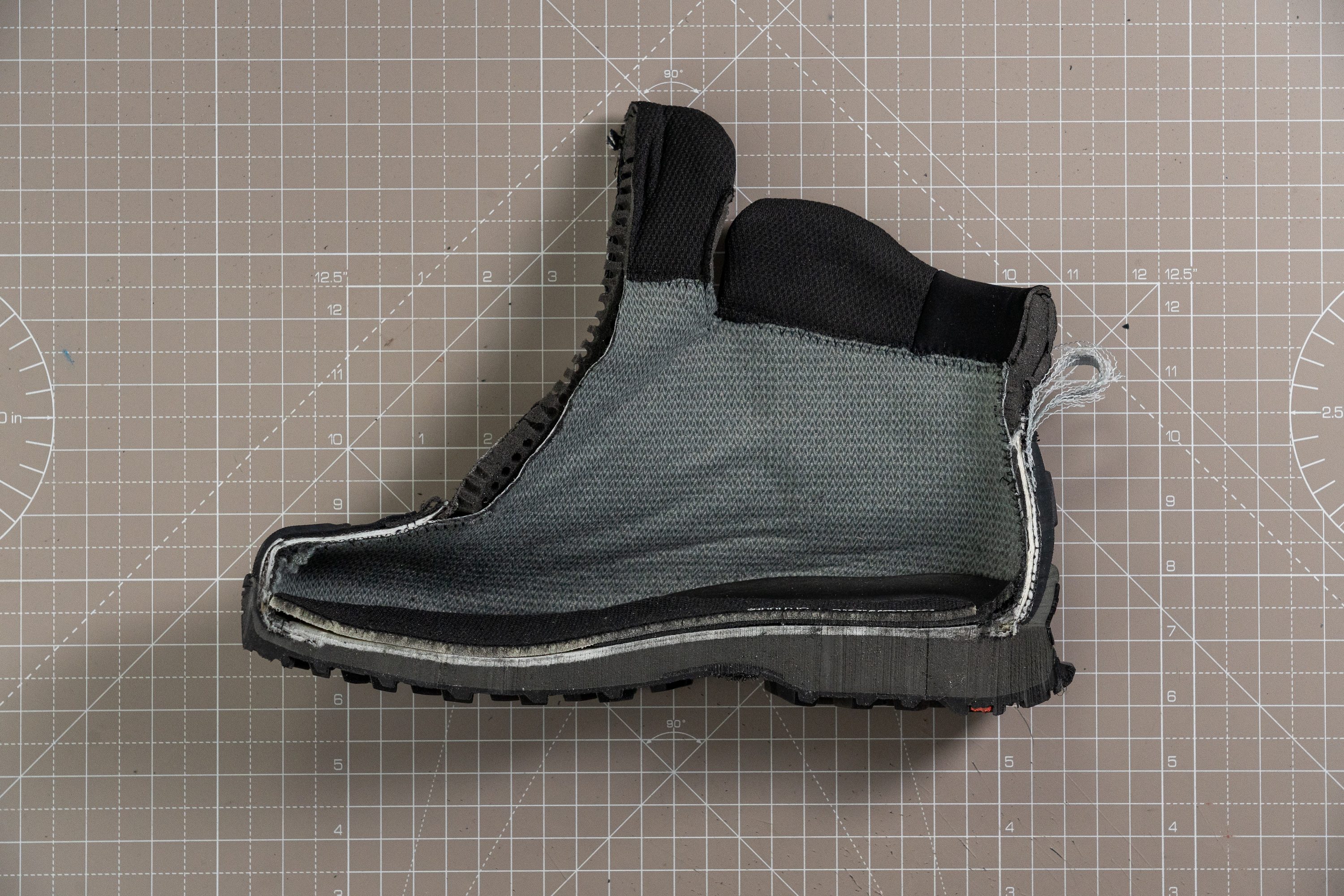
Personally, we never found the boot's drop to be troublesome as it gave our heels plenty of impact protection upon landings. And even though it mutes out the ground feel big time, it also minimizes foot fatigue at the end of the long day.
| Quest 4 GTX | 18.0 mm |
| Average | 13.3 mm |
Midsole softness
UpdatedSalomon was never famous for soft cushioning, and the Quest 4 GTX is no exception. Pressing a durometer against the boot's primary foam, the tool showed 52.9 AC.
Proving to be 12% firmer than the category average, it feels quite firm underfoot.
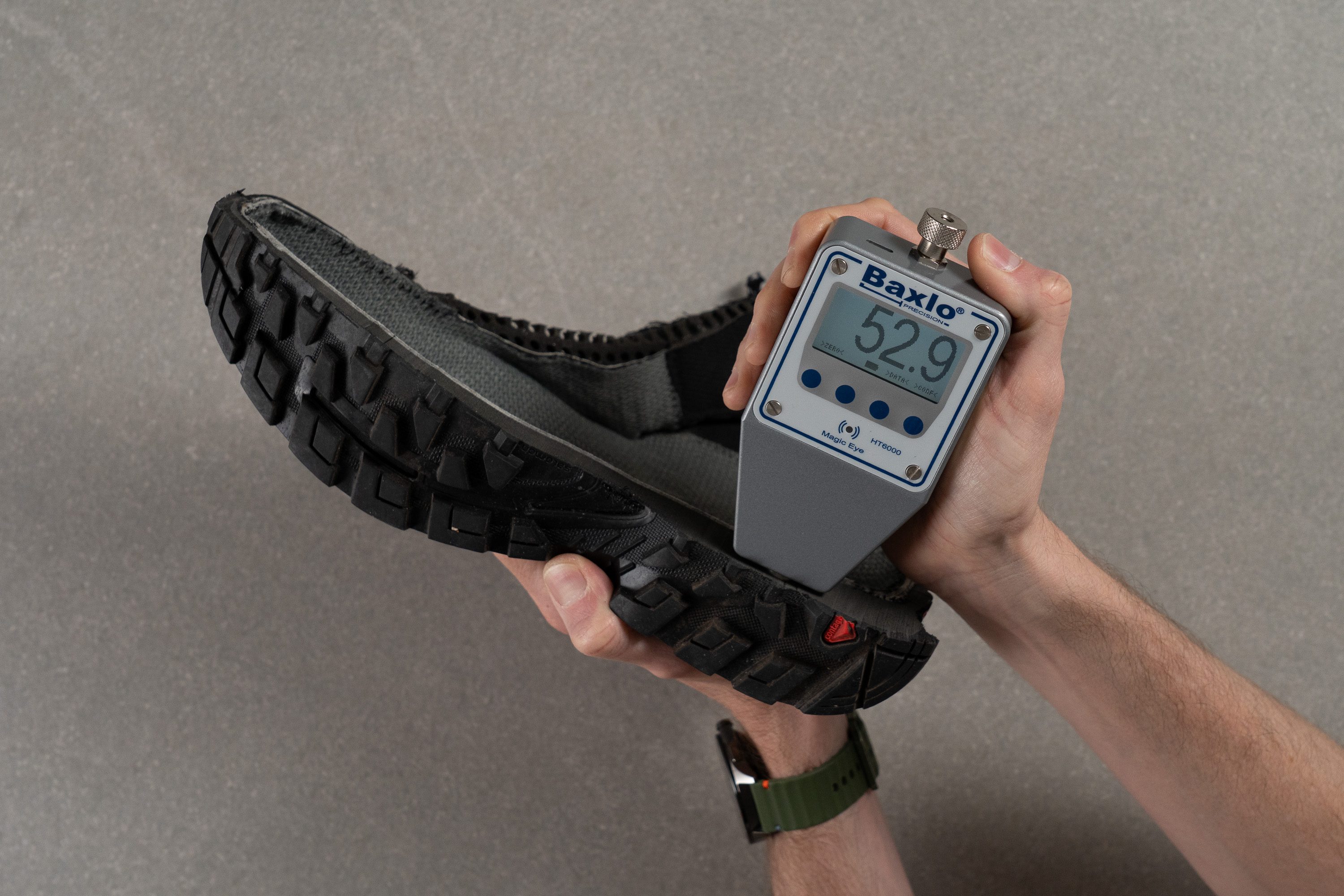
| Quest 4 GTX | 52.9 AC |
| Average | 47.3 AC |
Size and fit
Size
Salomon Quest 4 GTX fits true to size (80 votes).
Internal length
| Quest 4 GTX | 267.7 mm |
| Average | 271.4 mm |
Width / Fit
For a medium-width backpacking boot, the Salomon Quest 4 GTX offers a good amount of breathing room. To check exactly how spacious it is, we filled its interiors with custom gel and created a one-to-one mold.
According to our caliper, the widest area of the boot (between the big toe and the pinkie) is indeed above-average at 98.3 mm. In fact, it puts the Quest 4 into the wide width category! Hikers with wide feet are likely to appreciate the extra space.
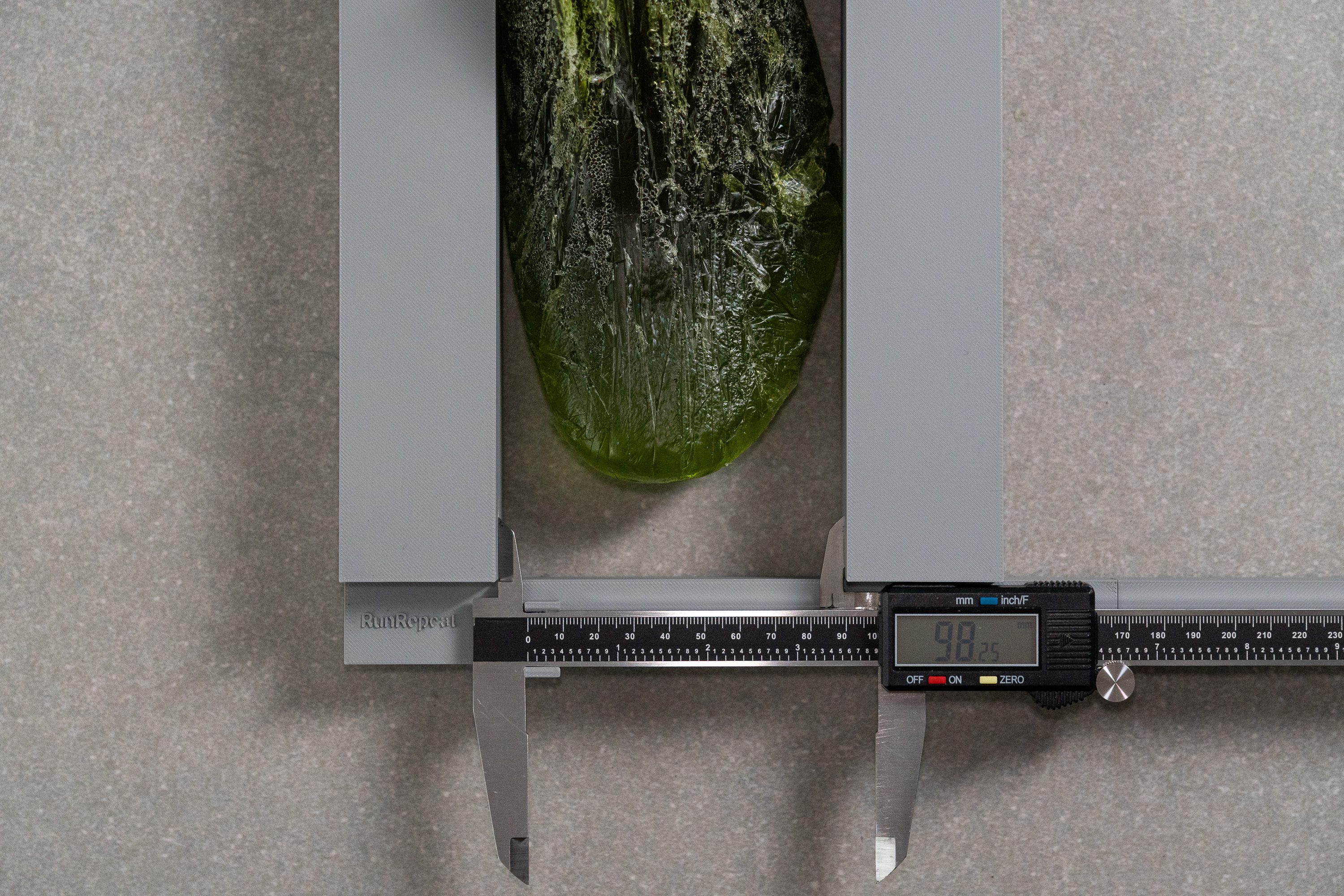
| Quest 4 GTX | 98.3 mm |
| Average | 93.8 mm |
Toebox width
Measuring the toebox width around the big toe, we got a more standard reading of 72.1 mm. This implies that the boot doesn't get pointy or restricting towards the toes and has some wiggle room for swollen feet and thicker socks.
The only downside is that this Salomon boot doesn't come in multiple widths. And because its fit is more appropriate for medium-to-wide feet, slim-footed hikers may want to opt for the Salewa Alp Trainer 2 Mid GTX or the LOWA Renegade GTX Mid instead.
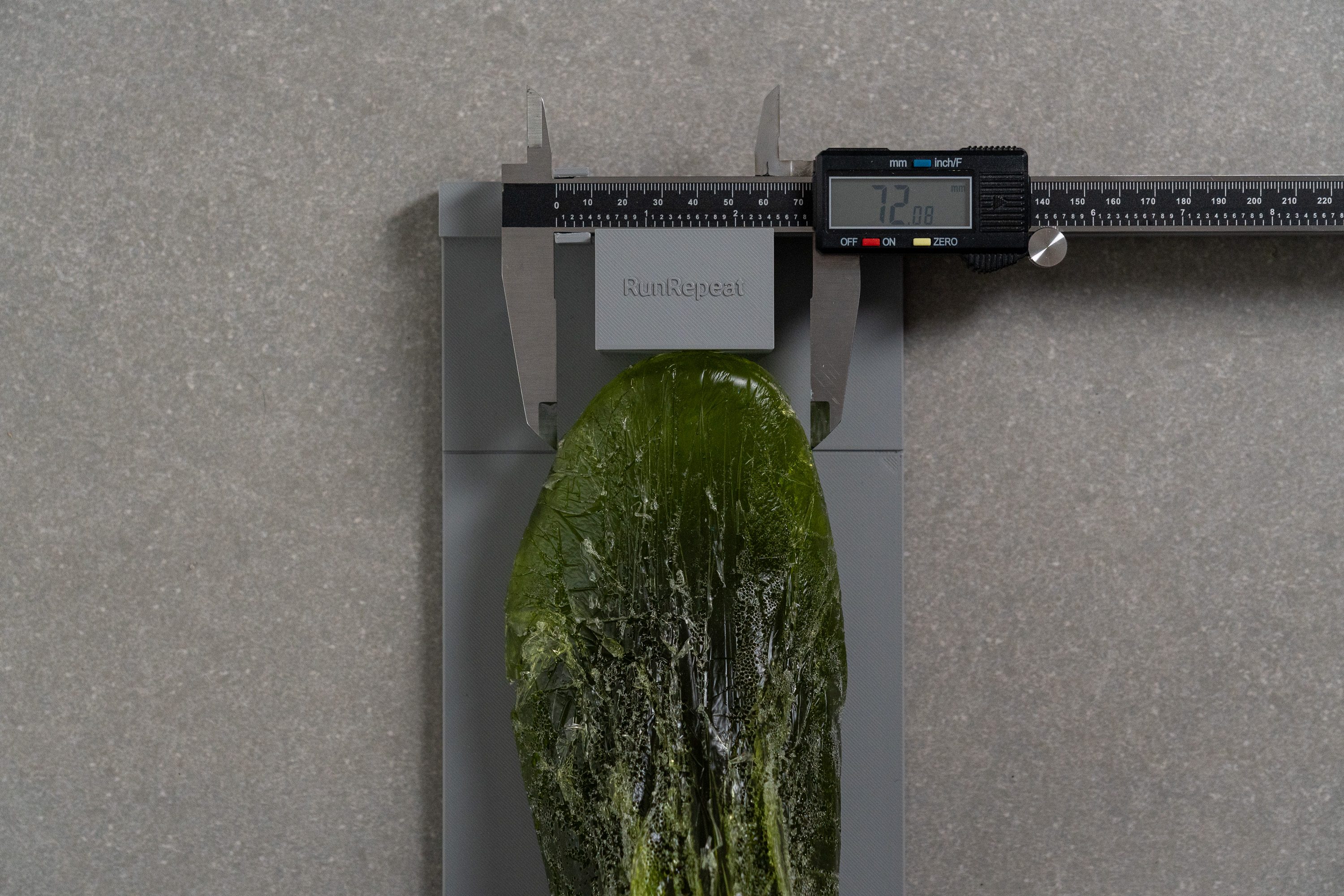
| Quest 4 GTX | 72.1 mm |
| Average | 71.2 mm |
Toebox height
Vertical space is not limited in the Salomon Quest 4 GTX either. The boot showed a standard toebox height of 27.1 mm on our caliper.
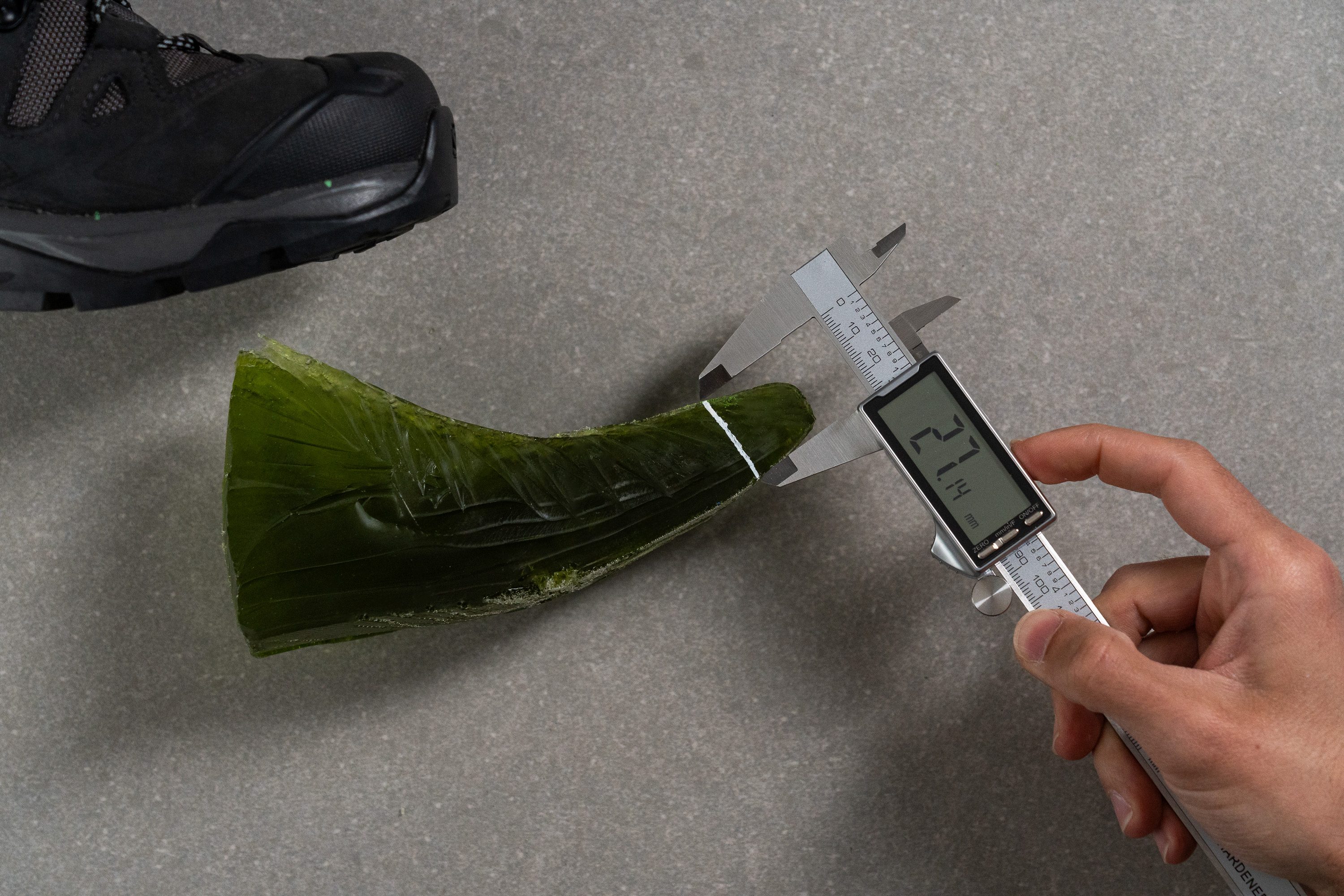
| Quest 4 GTX | 27.1 mm |
| Average | 27.4 mm |
Lacing
The lacing system is very well integrated into the boot's supportive features. Once we have it all cinched up, the Quest 4 GTX braces the foot very firmly.
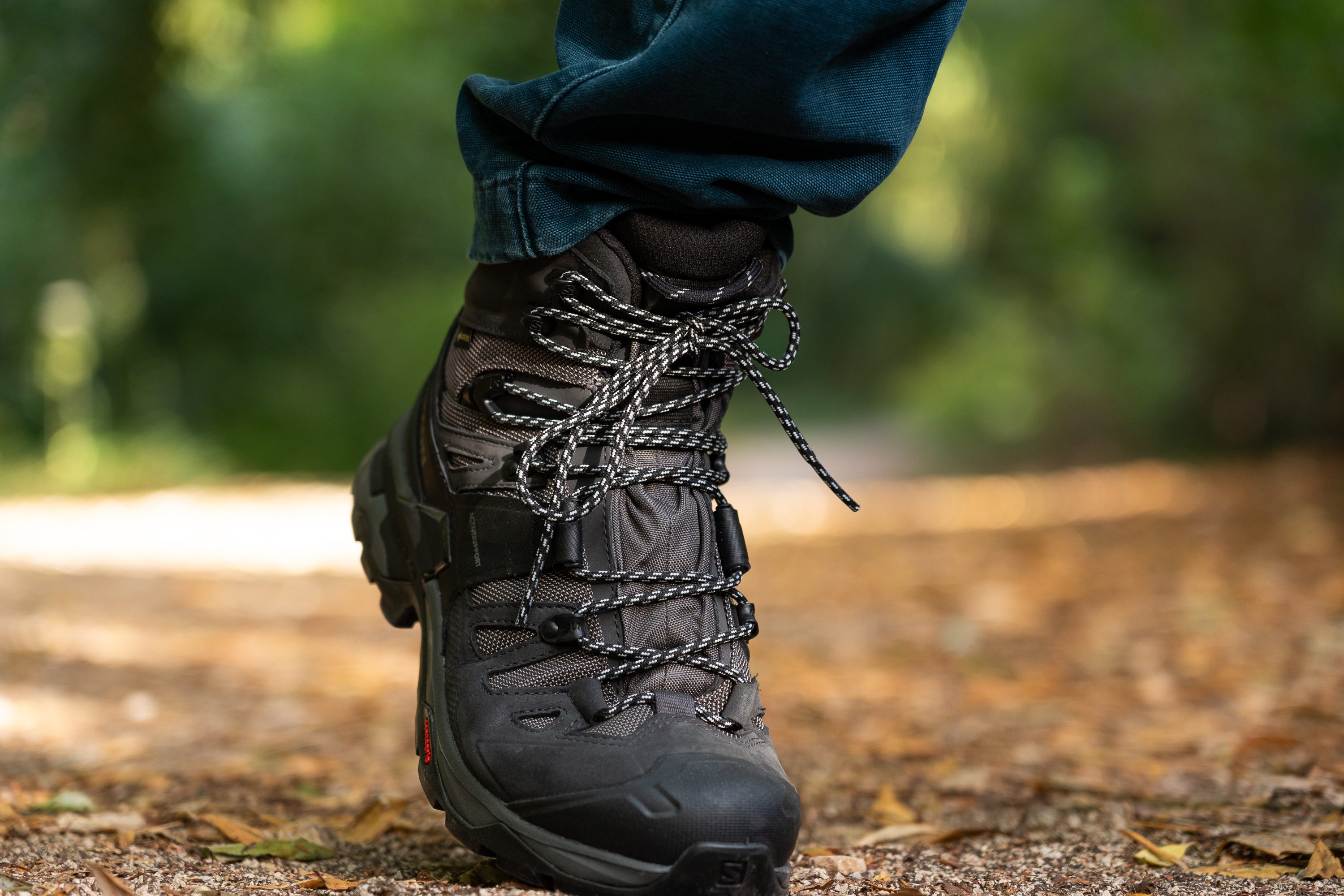
One of the locking eyelets is placed near the ankle bone. It helps to create a stronger lockdown around the ankle which helps with stability on steep slopes.
Traction / Grip
Lug depth
Based on our caliper measurement, the Quest 4 GTX has a lug depth of 4.7 mm.
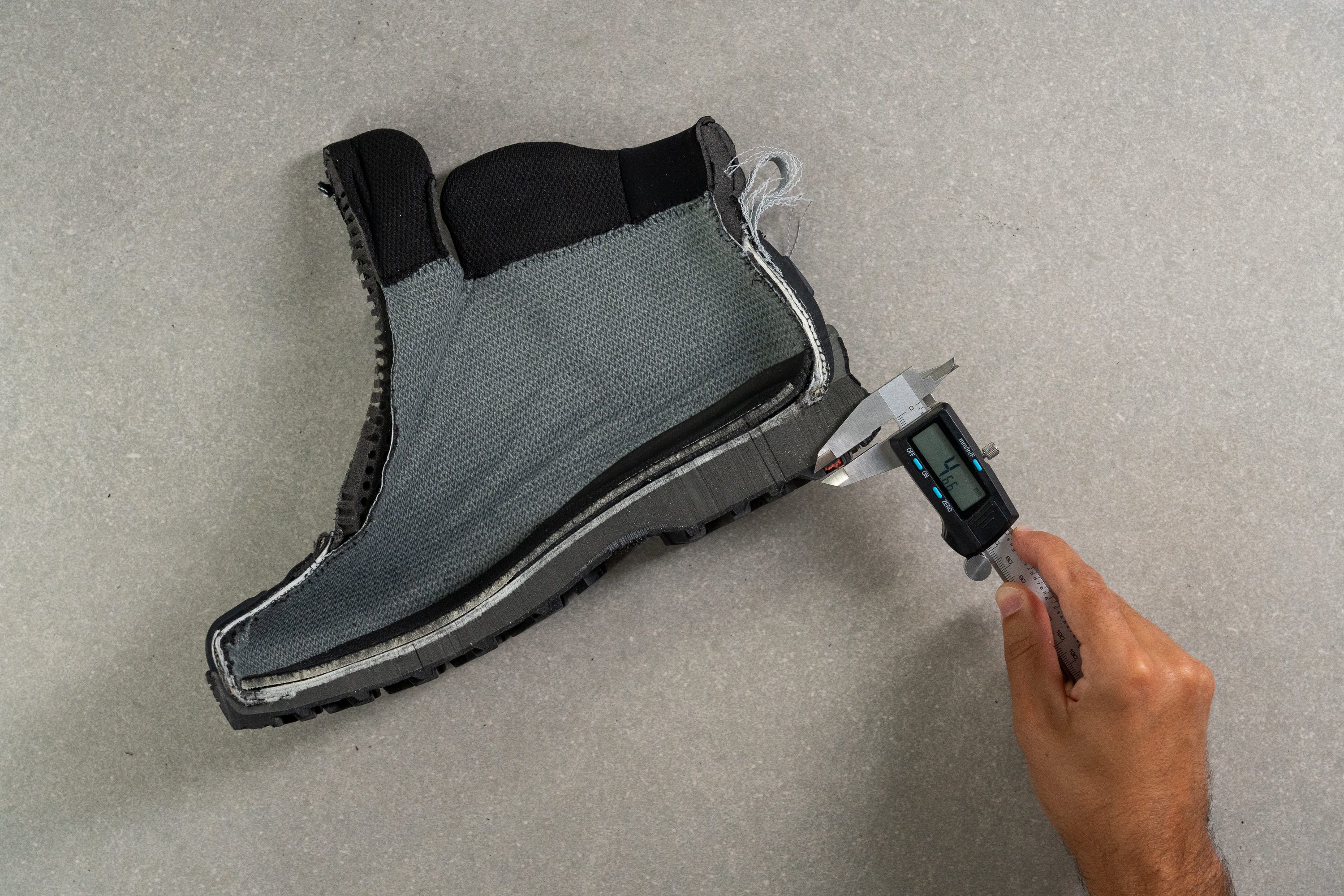
This makes the boot toothy enough for a wide range of surfaces:
- wet roots
- mossy logs
- loose rocks
- deep mud
- creek crossings
Salomon uses its proprietary Contagrip rubber which is not very soft and tacky (as we saw in our hardness test earlier) but we found it to be quite capable on challenging terrain.
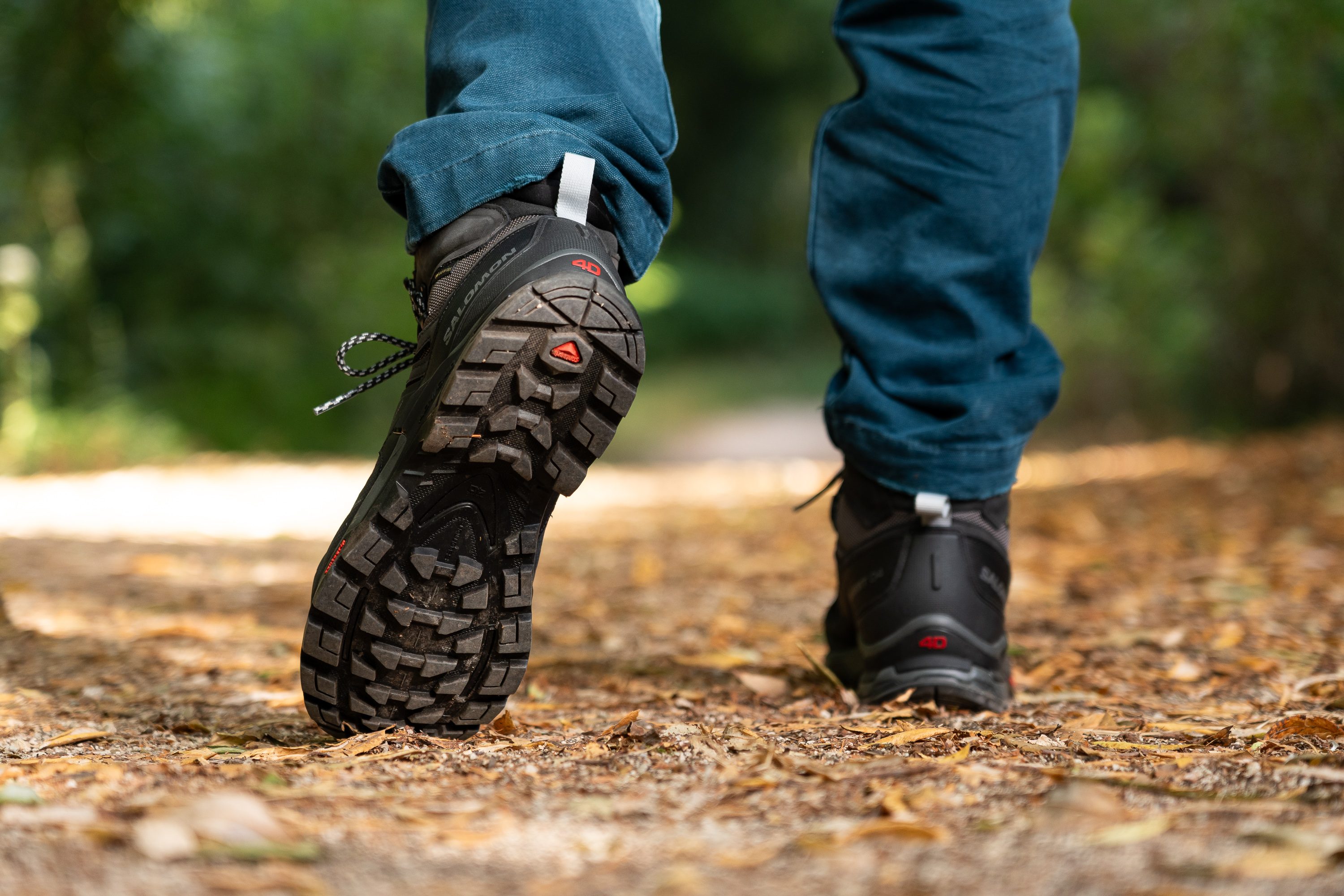
In muddy areas, the boot's widely spaced lugs were really effective in shedding the dirt and preventing its build-up underfoot.
| Quest 4 GTX | 4.7 mm |
| Average | 4.3 mm |
Flexibility / Stiffness
According to its product description, the Quest 4 GTX "respects the natural flexion of your foot." But that just made us laugh because its ultra-stiff built seems to have no respect at all! That's one of the most rigid backpacking boots we've tested in our lab.
Our flexibility tesing machine instantly disproved that statement revealing this Salomon boot's very stiff nature. Its burly construction required as much as 65.7N of force to bend by 30 degrees and that's more than 100% more than it takes an average boot!
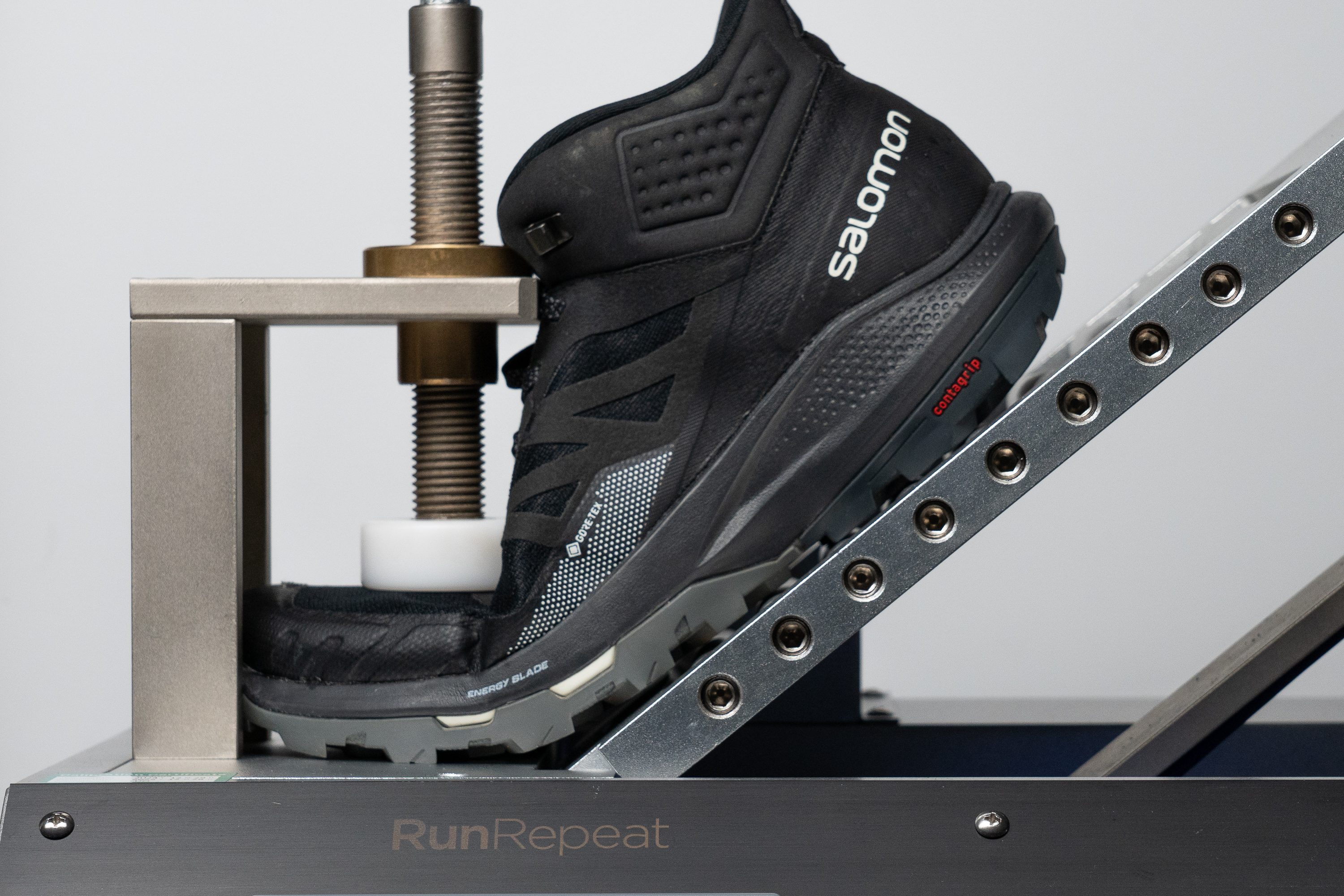
| Quest 4 GTX | 65.7N |
| Average | 31.5N |
Weight
The Salomon Quest 4 GTX is built like a tank for the trails and it screams heavy straight from the photo.
Thus, it was not surprising to see 23.4 oz (663g) on the scale when weighing the boot in a men's US size 9. While this is significantly heavier than hiking boots on average, it is an expected weight for a backpacking boot of this kind.
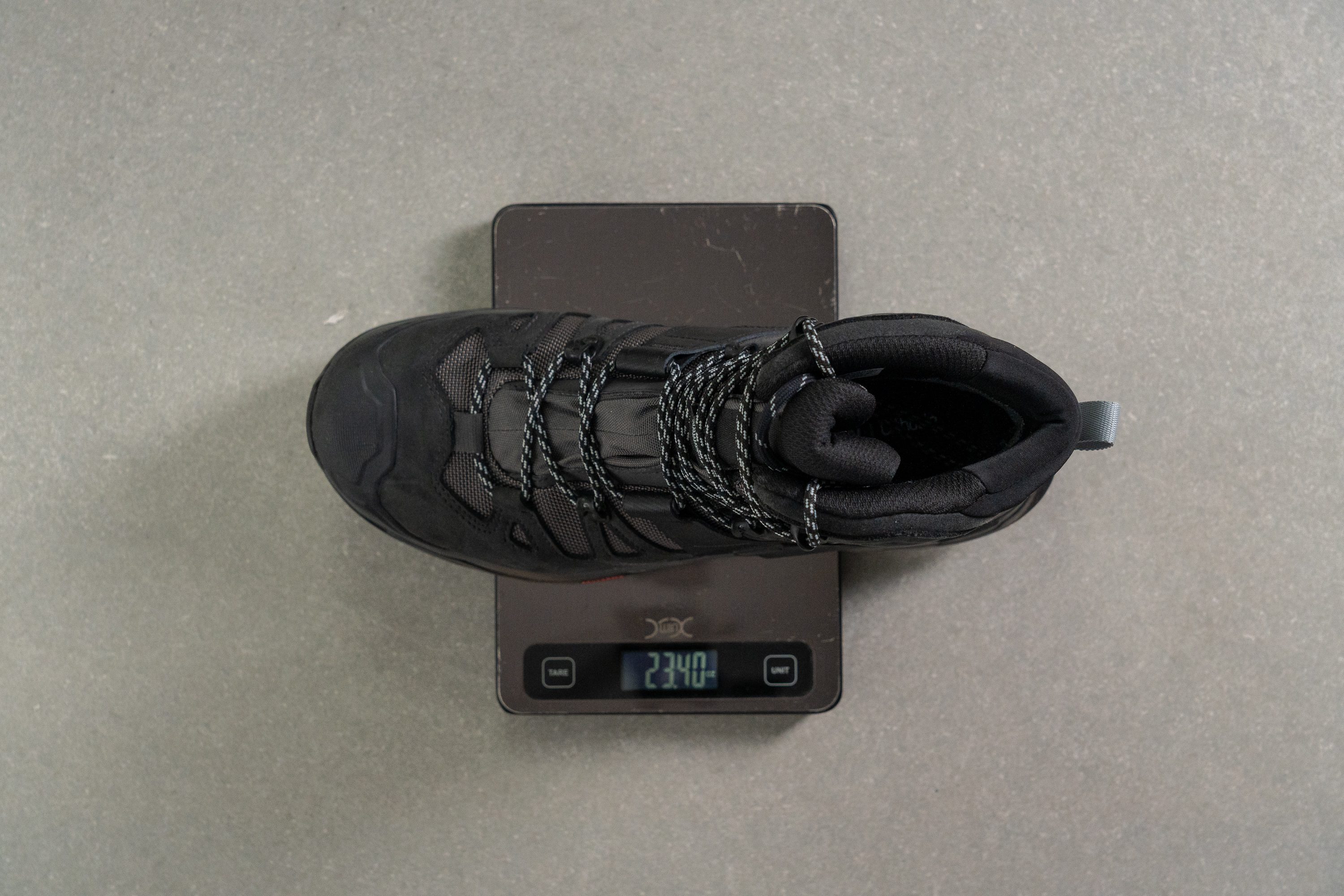
| Quest 4 GTX | 23.4 oz (663g) |
| Average | 18.7 oz (531g) |
Breathability
Forget about summer hikes if you intend to wear the Salomon Quest 4 GTX. With its top-notch waterproofing, high cut, and generous padding, there is no room for being breezy.
In our breathability test below, we use a machine to pump smoke through the uppers of both boots to see how easily it escapes through the fabric. As you can see, there is not even a hint of vapor in the Quest. Thus, we gave it the lowest breathability score of 1 out of 5.
As our follow-up transparency test shows, the boot has zero perforations or potential ventilation areas.
| Quest 4 GTX | 1 |
| Average | 1.3 |
Stability
Lateral stability test
Stability is the Quest's second name. There aren't that many backpacking boots that could provide the same level of steadiness as this Salomon offering.
There are so many stabilizing components embedded into the boot but the absolute leader is the brand's proprietary ADV-C 4D Chassis. Wrapping around the heel and sides of the boot, this uber-stiff component clutches the heel and ankle very firmly in place.
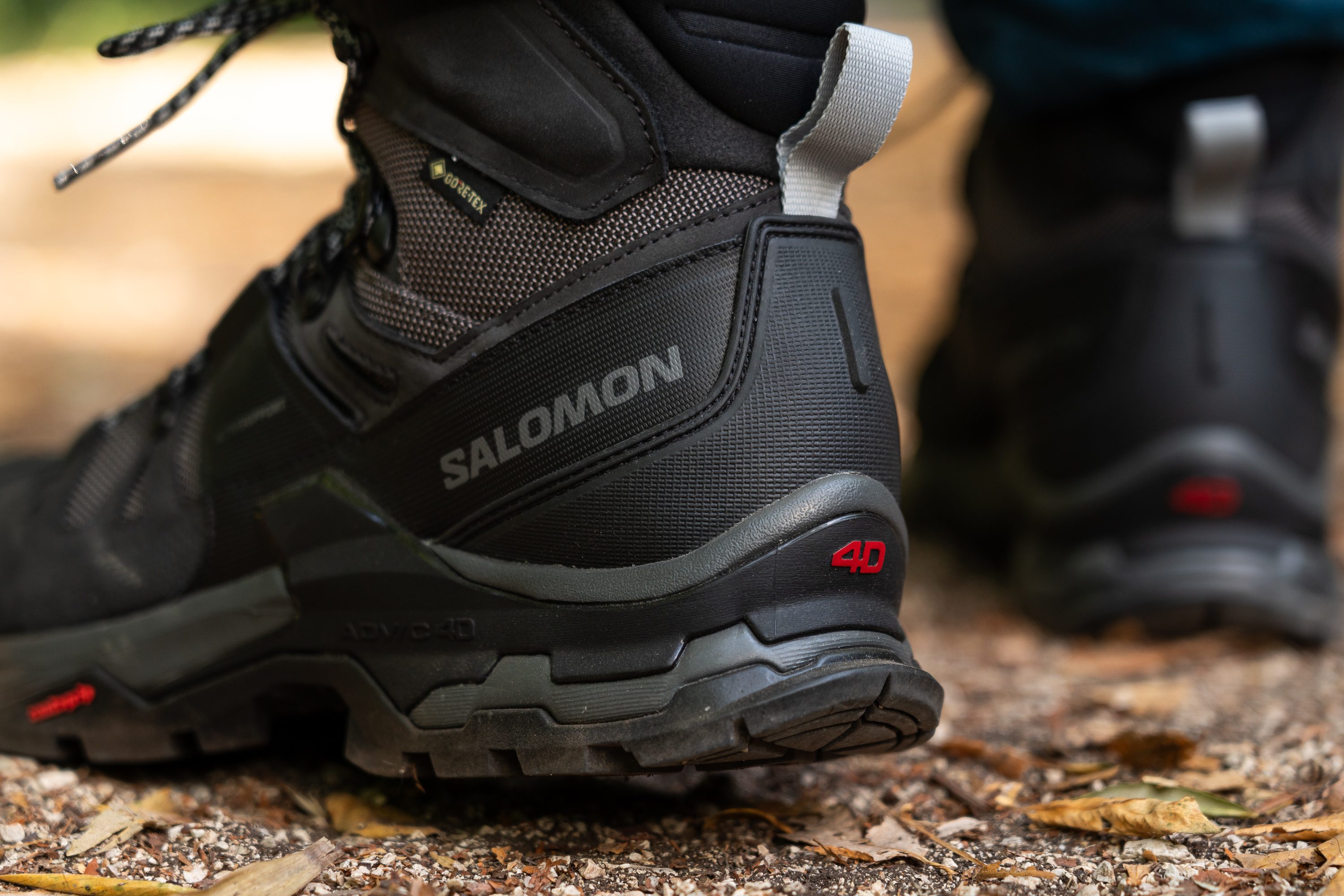
As a result, this whole structure prevented our ankles from rolling or wobbling every time we took a step. Having so much stability not only made us feel more surefooted but also decreased foot fatigue significantly over the course of the long hike. That's because none of our energy was wasted trying to stabilize the foot on uneven terrain.
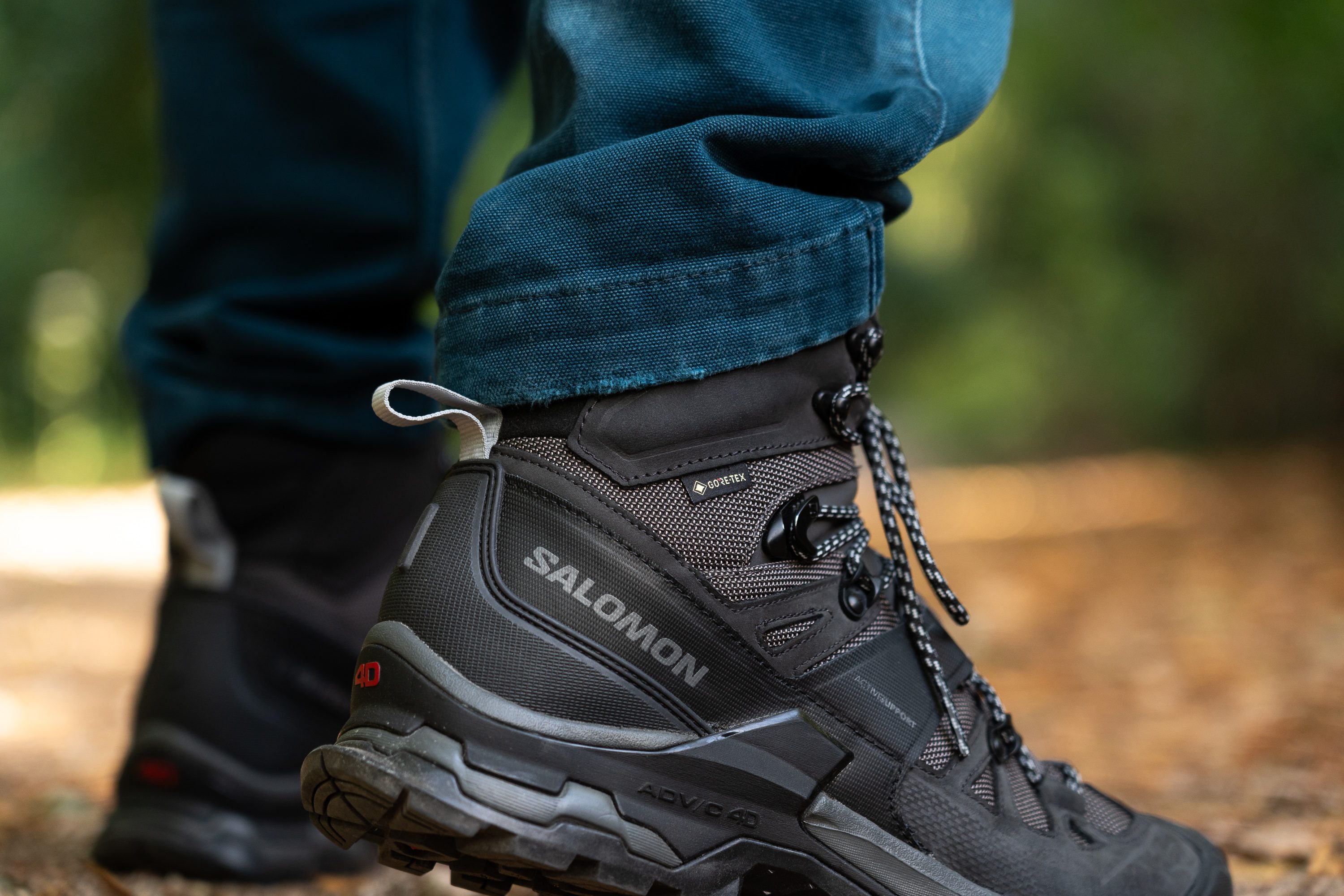
Torsional rigidity
The Salomon Quest 4 GTX is the quintessence of stiffness. Attempting to twist the boot in our hands was to no avail because of the boot's chassis, supportive overlays, and sturdy materials.
For that reason, we rated its torsional rigidity with a maximum of 5 out of 5. This hiking boot simply doesn't have ankle rolls in its vocabulary.
| Quest 4 GTX | 5 |
| Average | 4.4 |
Heel counter stiffness
In addition to the stiff base, the Quest also comes with a super rigid and secure heel counter.
Assessing its stiffness in our manual test, we gave it a solid 5 out of 5. We never experienced heel slippage or anything even close to that while testing this Salomon boot.
| Quest 4 GTX | 5 |
| Average | 3.6 |
Midsole width - forefoot
The boot comes with a fairly wide base that doesn't go over the board.
Measuring the widest part of the sole in the forefoot, we got 116.5 mm. That's a few millimeters wider than average, making our steps more confident on mixed terrain.
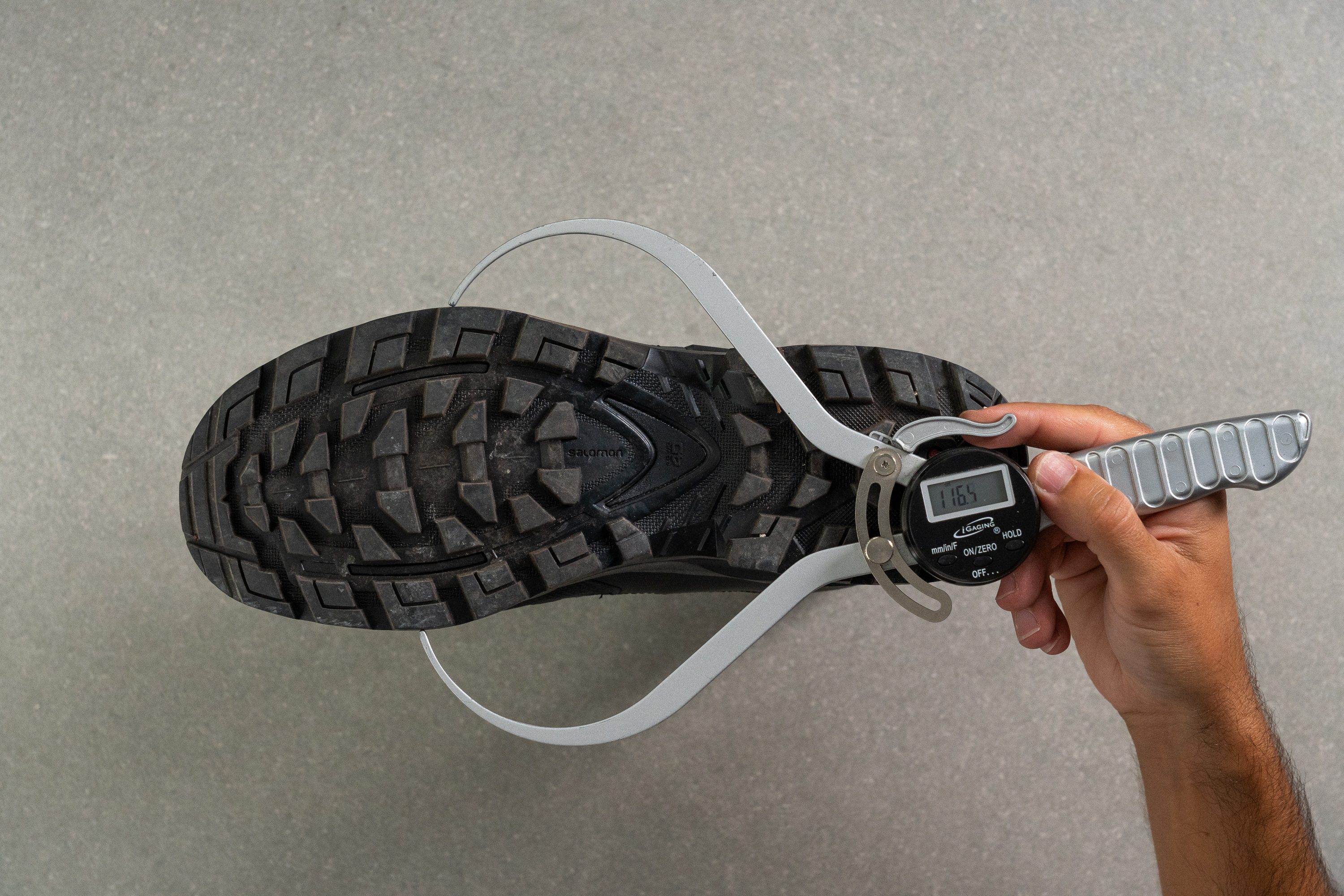
| Quest 4 GTX | 116.5 mm |
| Average | 111.5 mm |
Midsole width - heel
Surprisingly, the widest part of the heel wasn't as wide as we expected. With a caliper measurement of 85.7 mm, it is half a centimeter narrower than average.
If you are someone who relies on a really wide landing area to feel confident, have a look at the Kaha 2 GTX from Hoka (106.1 mm).
Actually, we didn't mind the narrower heel of the Salomon Quest because it proved to be much more maneuverable when navigating small rocks.
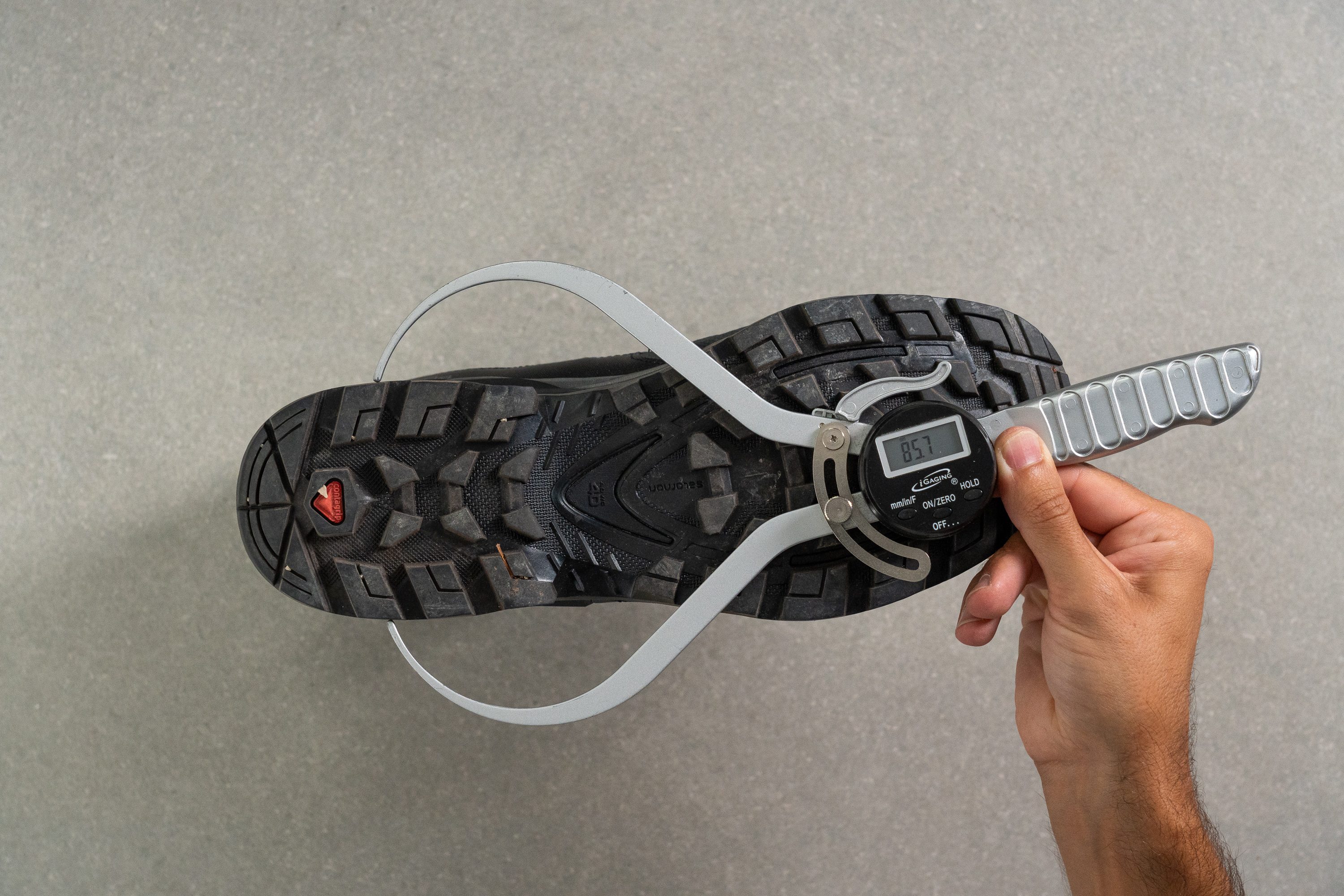
| Quest 4 GTX | 85.7 mm |
| Average | 87.6 mm |
Durability
Toebox durability
The rugged design of this Salomon boot kind of reminds us of a fortified castle with multiple layers of defense (and a moat with crocodiles).
In the upper, the Quest 4 uses a mix of Nubuck leather, sturdy Cordura-like textile, and additional rubberized overlays. As you can imagine, our attempt to put a dent in the boot's upper was unsuccessful, to say the least.
Drilling the toebox for a good 12 seconds with a Dremel, all we got was a minor scratch that didn't affect the boot's integrity at all.
On a 1-5 scale where 5 is the most durable, we could readily give it a 10!
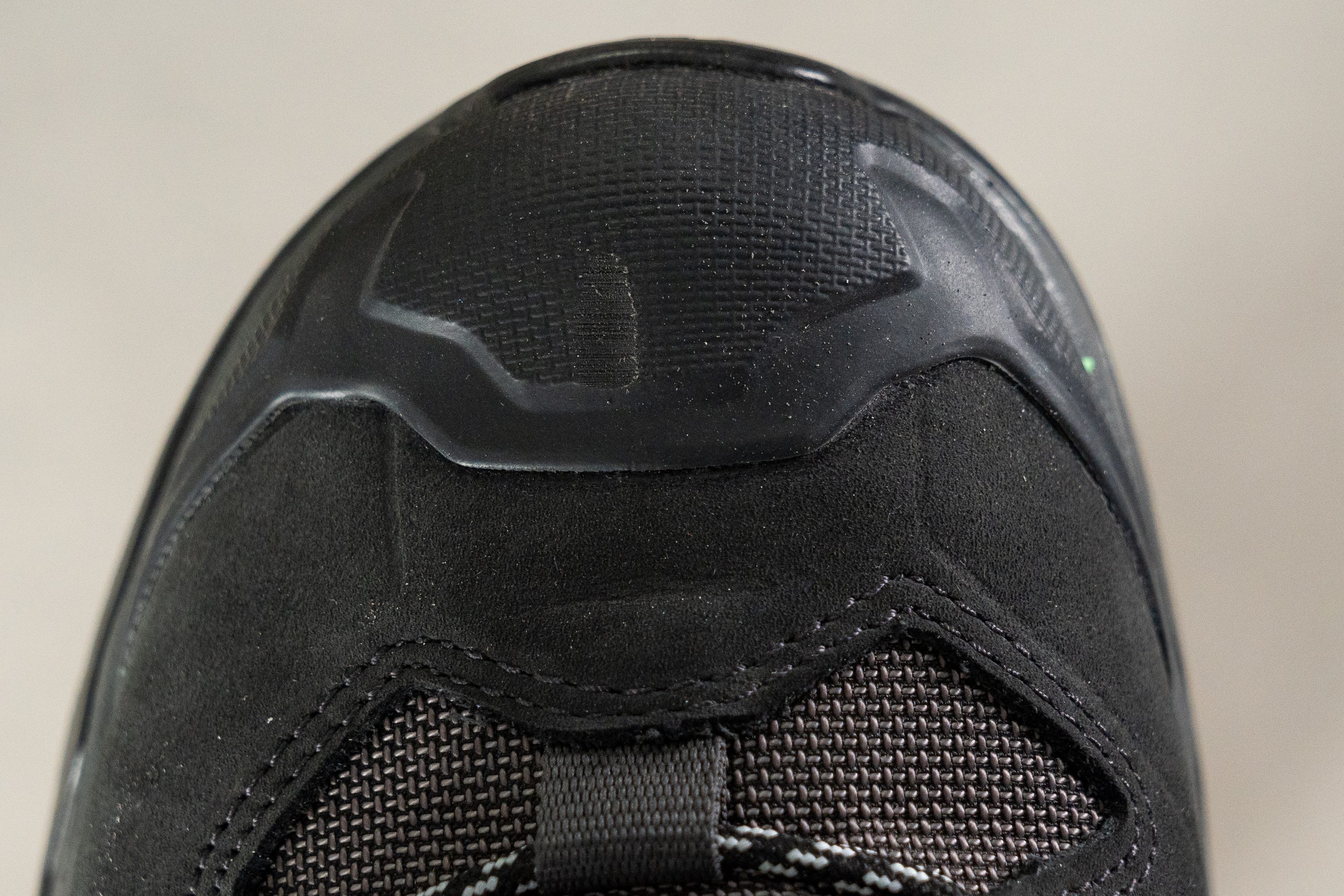
For reference, here is what the same durability test did to a regular day hiking boot from Hoka.
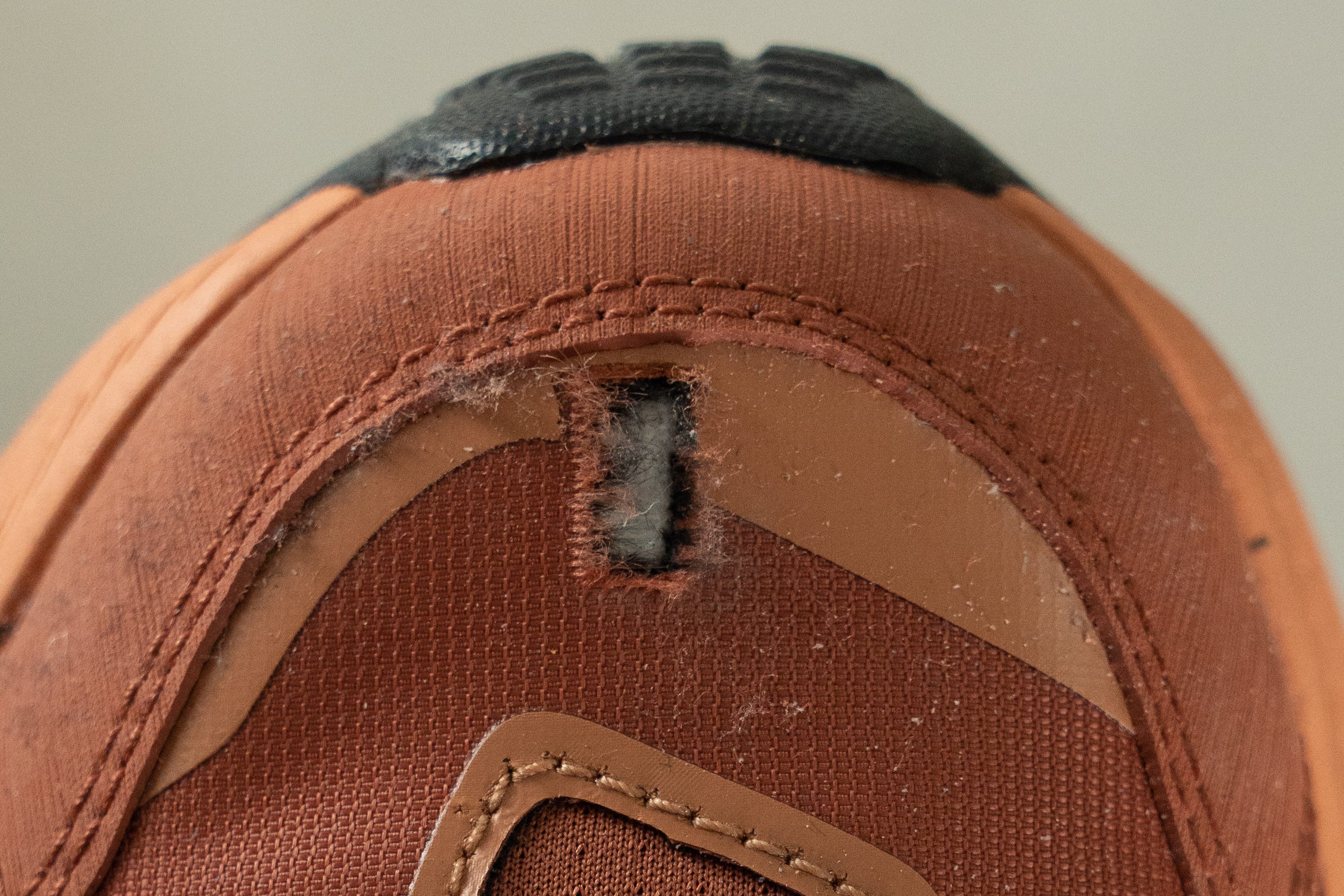
| Quest 4 GTX | 5 |
| Average | 4.3 |
Heel padding durability
We subjected another potentially frail part of the boot to our Dremel test - the heel padding.
Applying the tool for 4 seconds straight with a consistent speed (5K RPM) and force (3.2N), the result was just as stunning as in the toebox. The lining was nearly unscathed!
Based on how small the damage was, we rated the durability of the boot's heel padding with the highest rating of 5. No need to worry about chafing your tall socks against the boot.
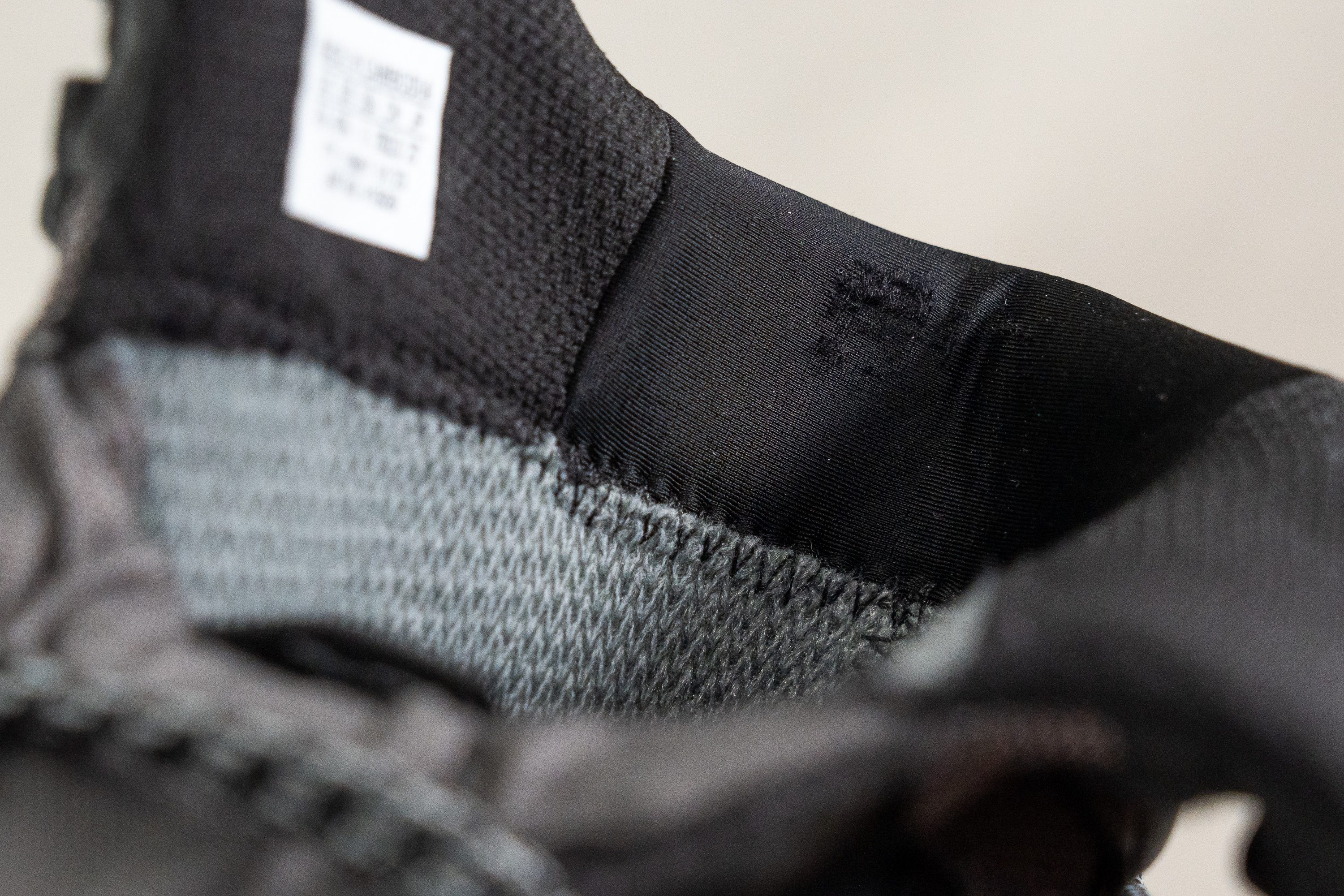
| Quest 4 GTX | 5 |
| Average | 3.6 |
Outsole hardness
Given how much is expected of a hiking boot of this caliber, Salomon did its best with the Quest 4 GTX.
First of all, the brand used a nice and hard rubber compound to make up the outsole. Measuring it with our durometer, we got a reading of 88.3 HC. This puts the boot on the harder side of the spectrum which also means that it is harder to wear out.
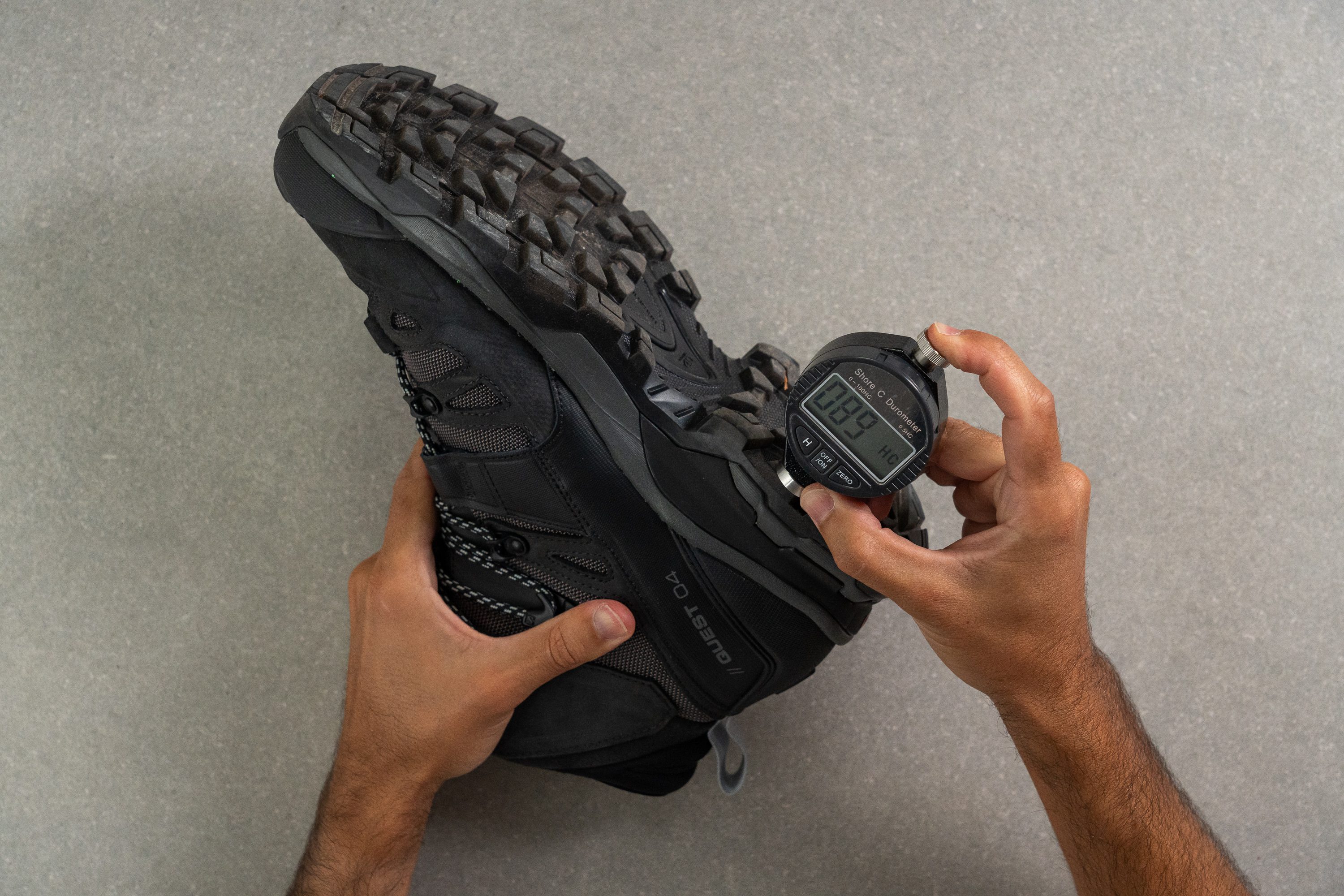
| Quest 4 GTX | 88.3 HC |
| Average | 87.1 HC |
Outsole durability
We couldn't help but drill the outsole with our trusty Dremel too. After 22 seconds of torture at the highest speed of 10K RPM, we didn't even get through 1/3 of the lug!
According to our tread gauge measurement, the damage was only 1 mm deep.
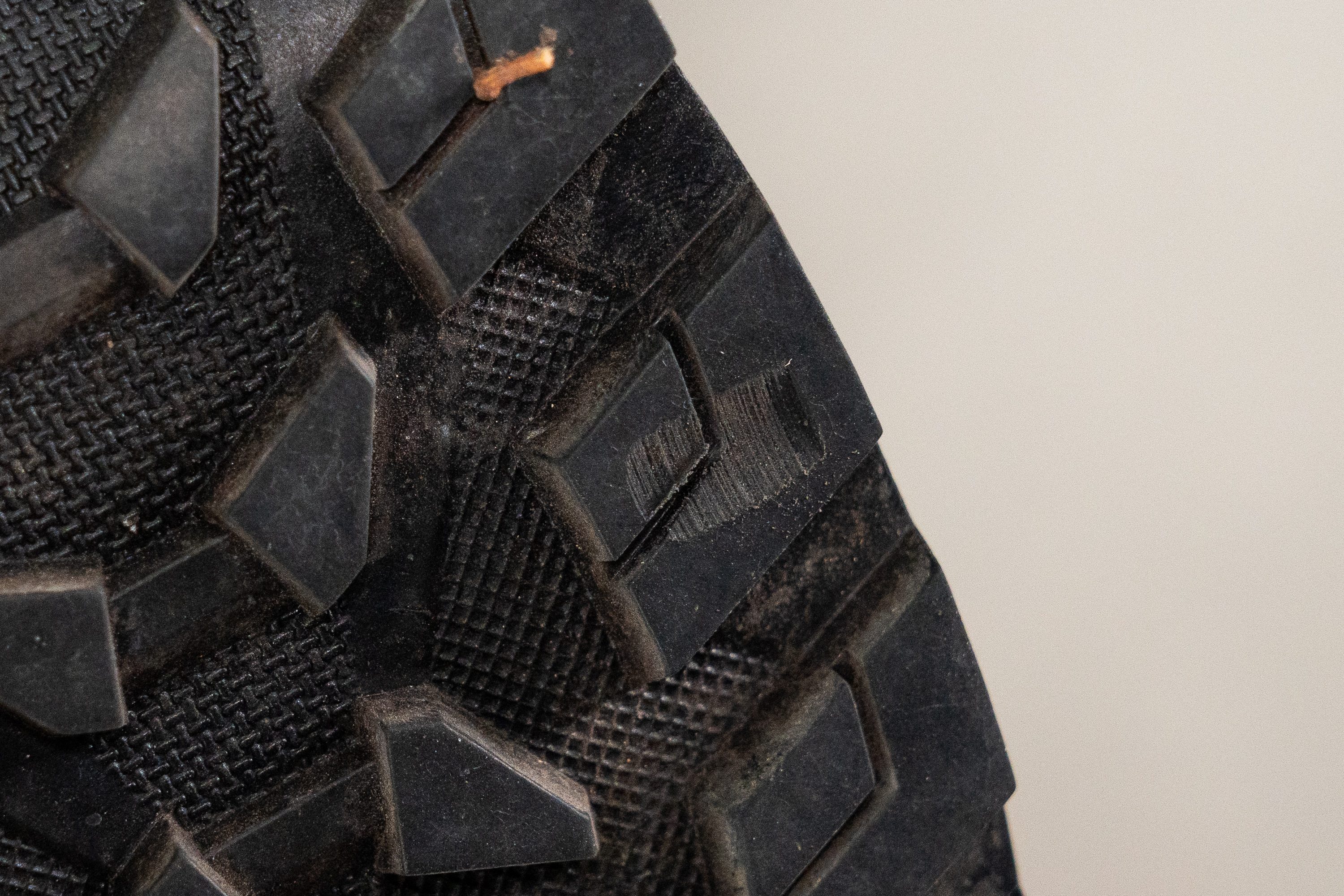
| Quest 4 GTX | 0.7 mm |
| Average | 0.8 mm |
Outsole thickness
Considering that the boot's outsole layer is 2.4 mm thick and the entire outsole (lugs included) is 7 mm thick, there is A LOT of rubber to go through before you can claim the pair to be worn out.
Thus, we expect a long and happy life from the Salomon Quest 4 GTX.
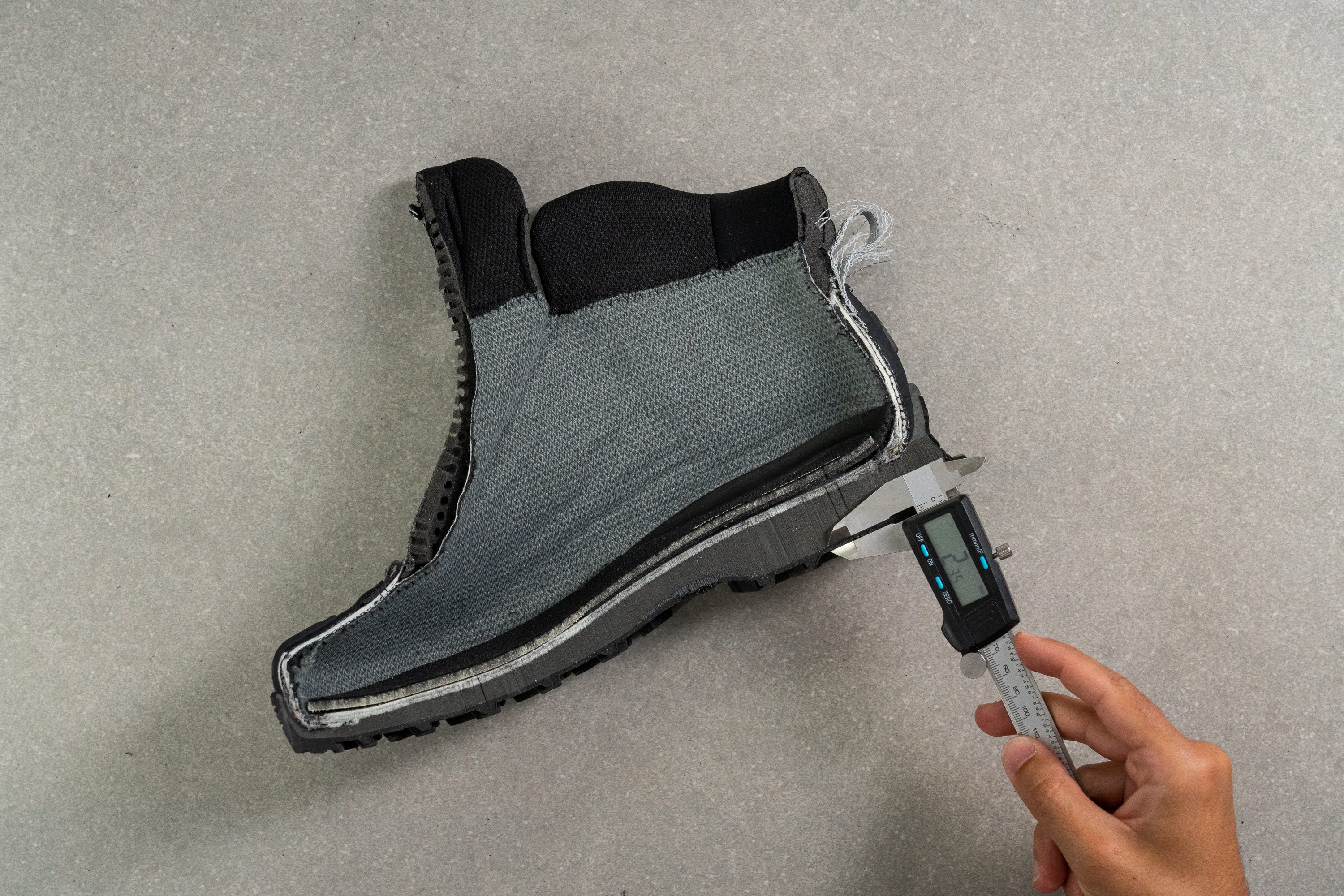
| Quest 4 GTX | 2.4 mm |
| Average | 2.9 mm |
Extra protection
The Quest 4 GTX is covered with multiple protective overlays to enhance durability and protect the foot from various outdoor hazards.
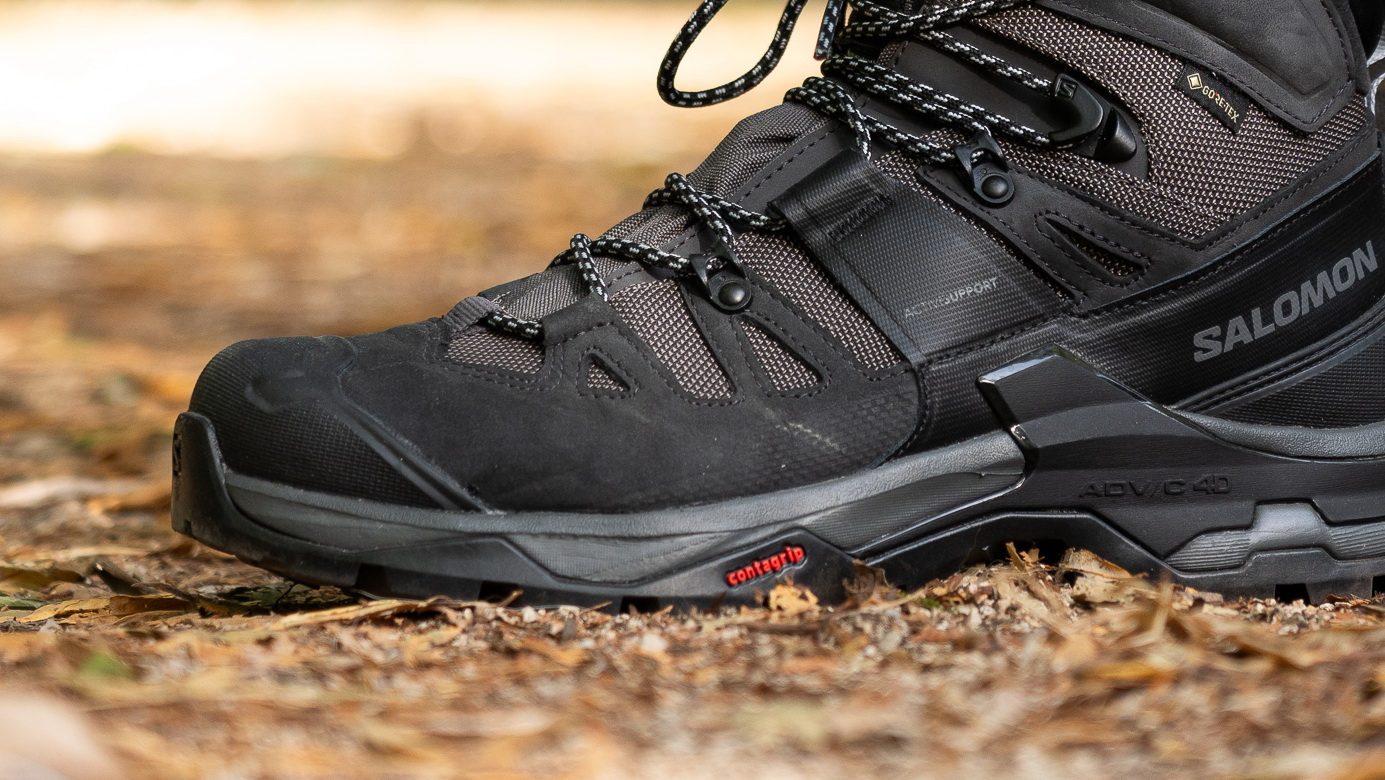
Most notably, the boot has a beefy toe bumper. Putting it through its paces on rocky terrain and light scrambling, we were amazed at its ability to keep the toes safe and sound.
Misc
Insole thickness
Salomon went for a slightly thinner than average insole in the Quest 4 GTX. Measuring its thickness in the heel, we got 5.3 mm.
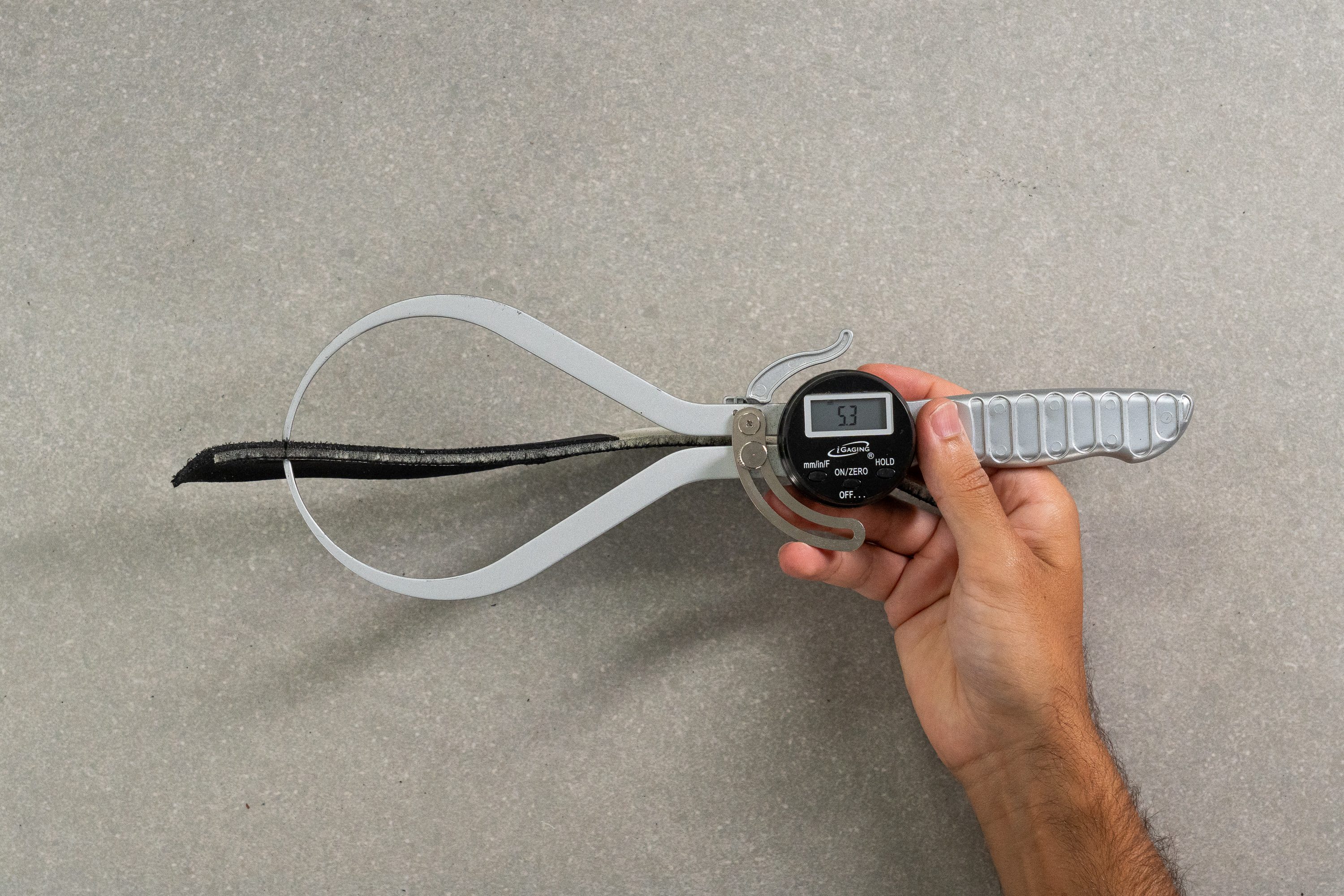
| Quest 4 GTX | 5.3 mm |
| Average | 6.0 mm |
Removable insole
If you prefer to swap insoles or need a custom orthotic, the boot's removable Ortholite insole allows for that.
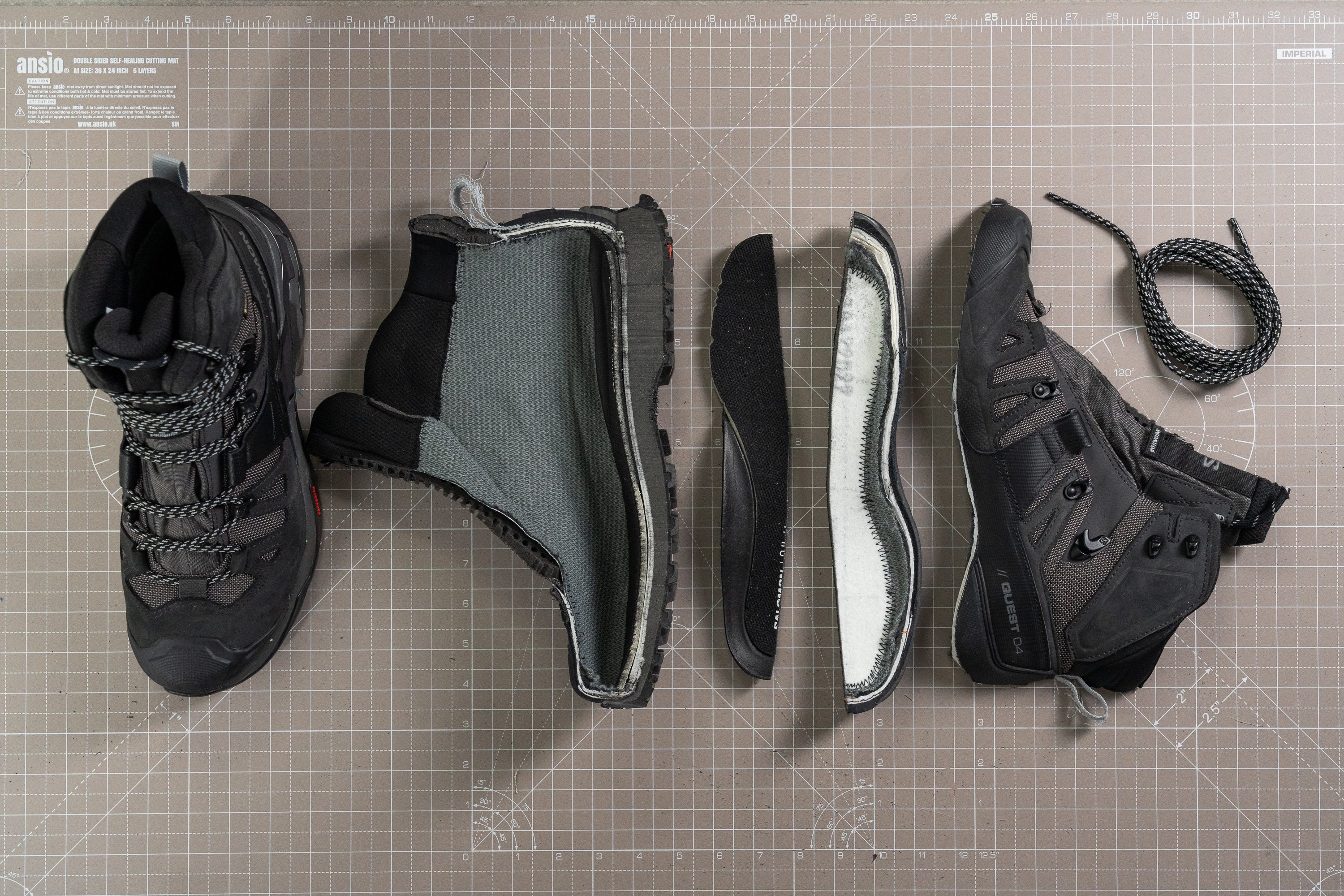
| Quest 4 GTX | Yes |
Midsole softness in cold (%)
Most likely you will be wearing this Salomon boot in lower temperatures and harsher climates. For that reason, we had to mimic cold weather conditions by placing the boot into the freezer for 20 minutes.
After that, we repeated the durometer measurement and found that the boot's midsole only firmed up to 32.9 HA, similar to the other hiking boots we tested.
Do expect the boot to feel a bit firmer compared to what it felt like at room temperature.
Measuring the difference in softness, we found that the Quest 4 GTX firmed up by 21.7%. That is an average difference compared to the rest of our hiking boots.
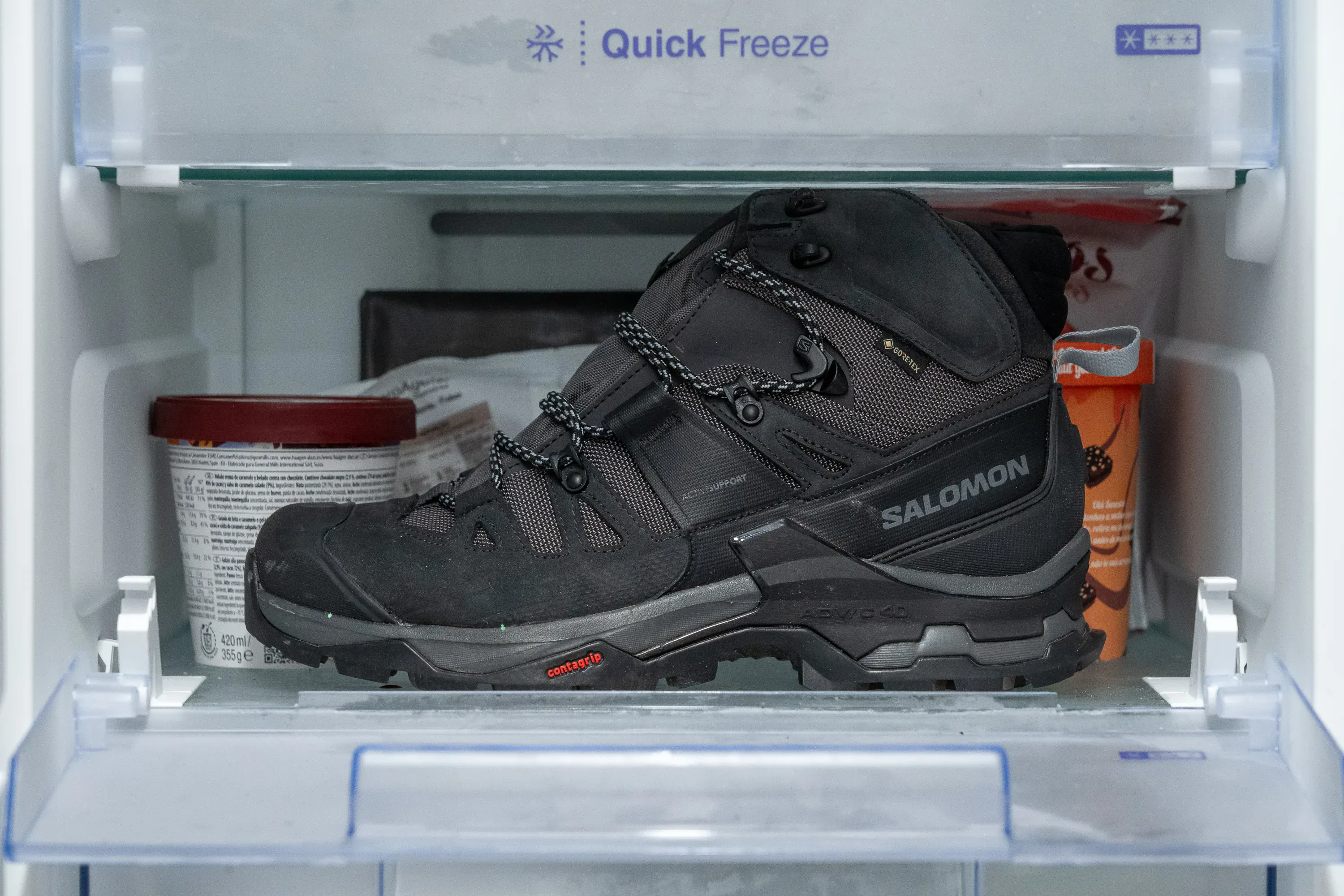
| Quest 4 GTX | 22% |
| Average | 20% |
Reflective elements
There are no reflective elements on the Quest 4 GTX from Salomon.
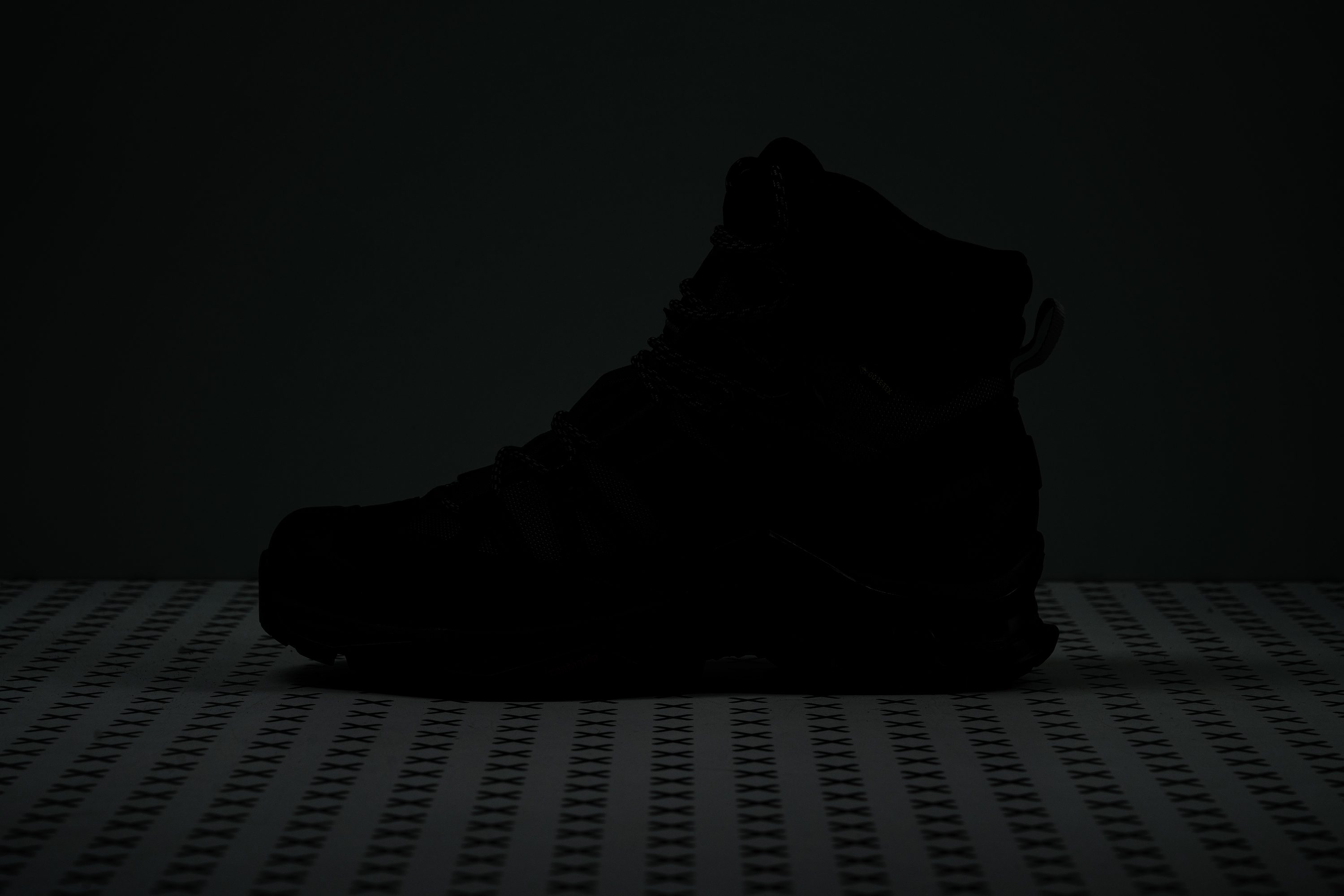
| Quest 4 GTX | No |
Tongue padding
The tongue is very adequately padded in the Quest 4 GTX. Measuring it with our caliper returned 10.7 mm, nearly the same as the average.
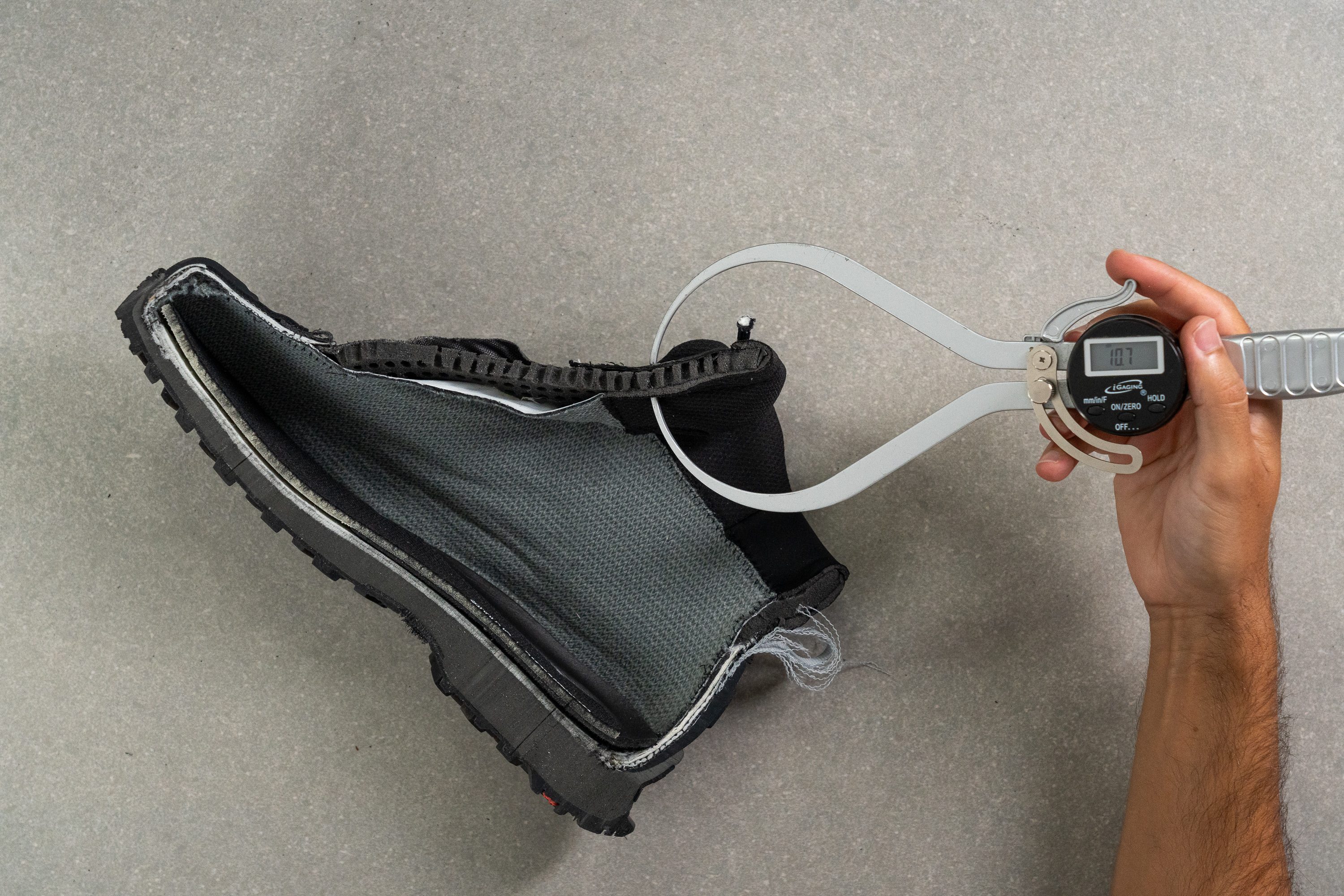
| Quest 4 GTX | 10.7 mm |
| Average | 11.2 mm |
Tongue: gusset type
As expected from a waterproof hiking boot, the tongue is fully gusseted in the Quest 4 GTX. The attachments extend pretty high up the shin, allowing you to step into deeper puddles trouble-free.
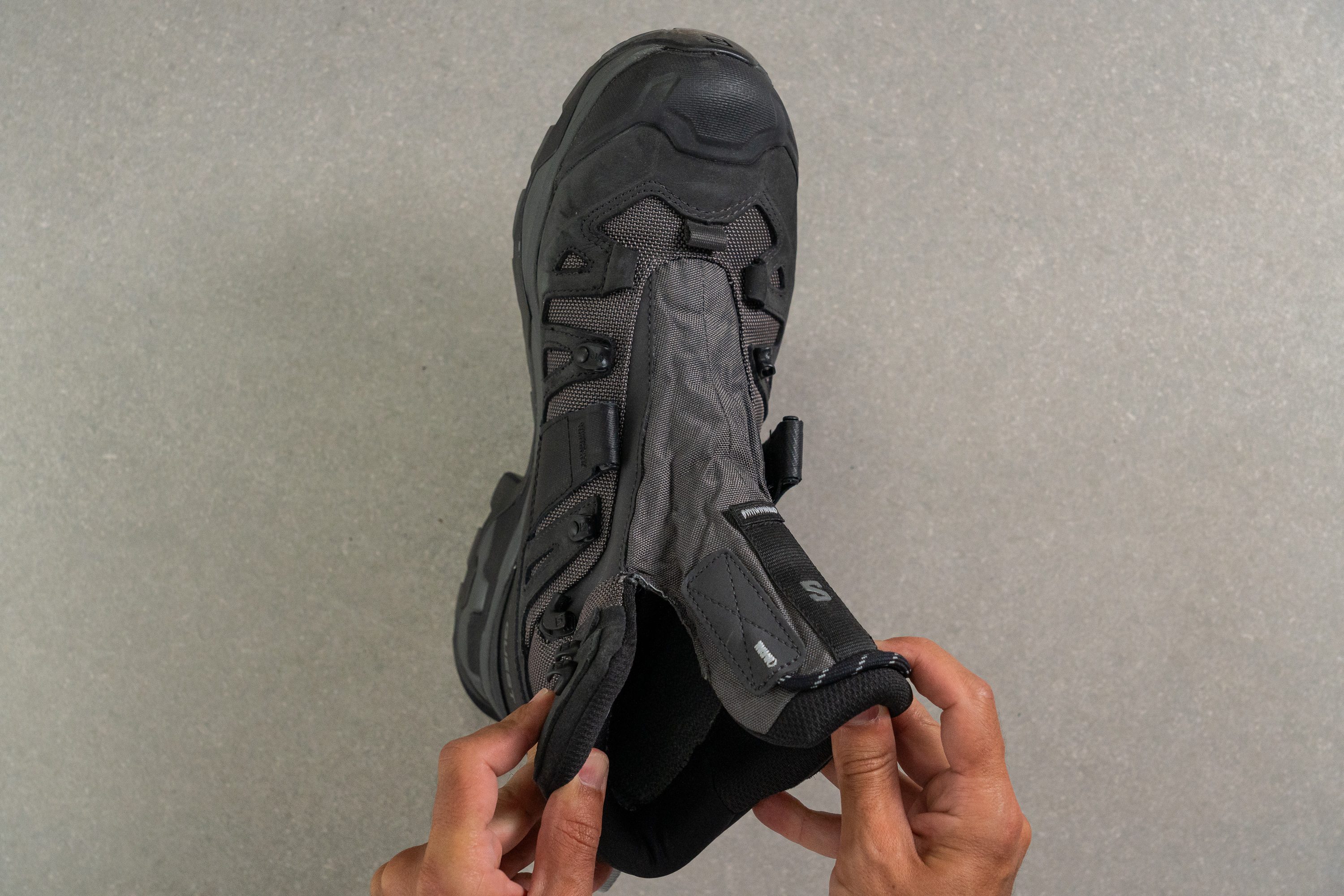
| Quest 4 GTX | Both sides (full) |
Heel tab
A handy finger loop at the back helps get inside the boot quicker.
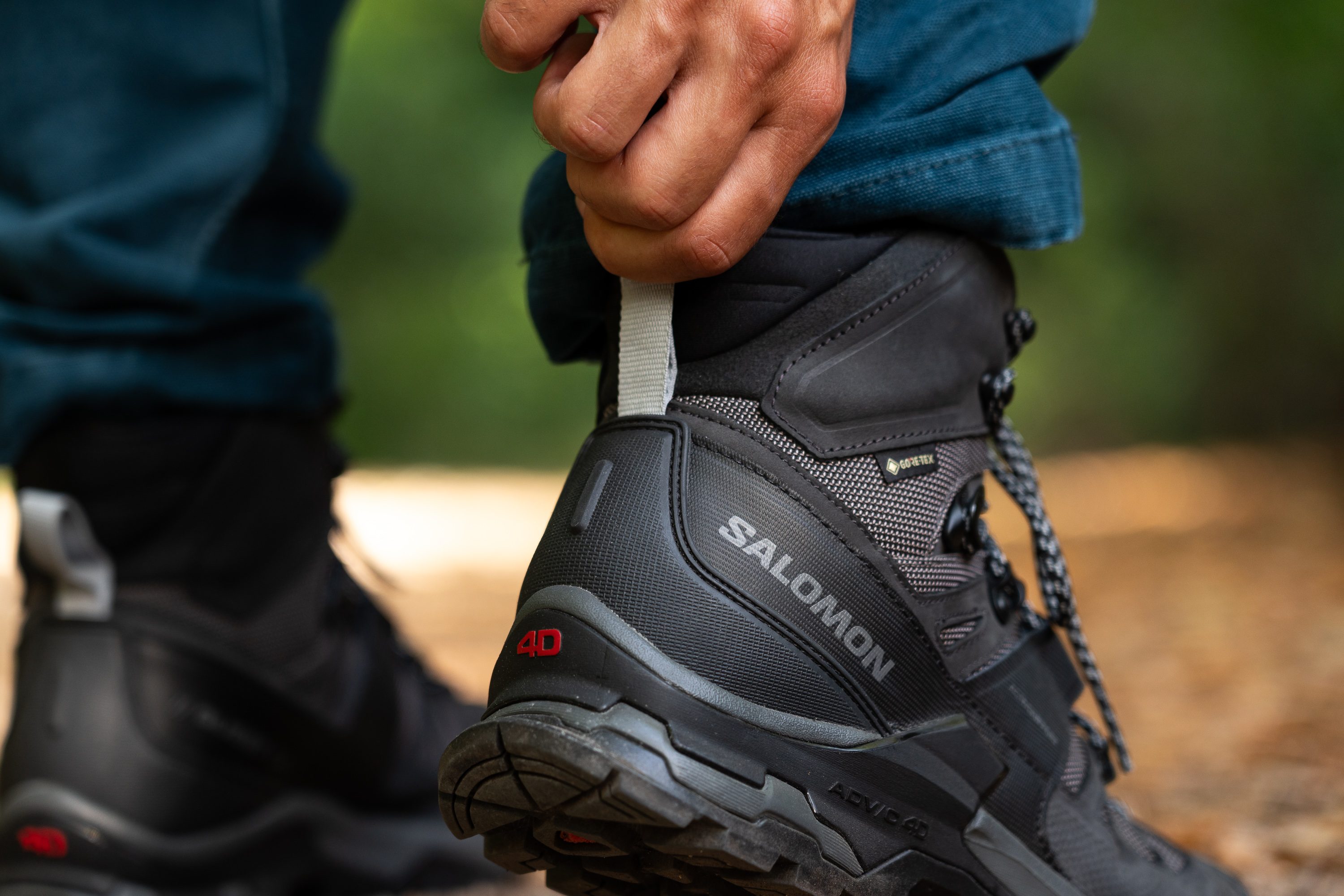
| Quest 4 GTX | Finger loop |
In-boot comfort
In spite of all its ruggedness, the Salomon Quest 4 GTX felt pretty comfortable from the inside. The padding, the Ortholite insole, the lining - these all work together perfectly to create a pleasant in-shoe experience. They help to make the break-in period in this boot feel less of a chore.
